|
|
Introduction
Medical Image Processing, Analysis and Visualization (MIPAV) Lab was founded by Distinguished Professor Dr. Xinjian Chen in June, 2012. The lab's main research is focused on medical image processing, analysis and its applications. We dedicate our effort in applying the methods and technologies of information engineering to solve problems in clinical practice, aiming to provide the physicians accurate quantitative analysis and visualization results, and to help them improve their level of diagnosis, treatment, and efficacy assessment.At present, the laboratory has 1 distinguished professor, 3 lecture and guest professors, 7 professors, associate professors and lecturers, 2 post-doctoral fellows, and more than 50 doctoral and master students.
The laboratory currently undertakes major basic research projects (973) Young Scientists Project, Natural Science Foundation of China General Project, National Natural Science Foundation of China Youth Fund, Jiangsu Provincial Natural Science Foundation Youth Fund, Jiangsu Provincial Normal University Natural Science Research Project, etc. The scientific research funding exceeds 30 million. The lab keeps close cooperation with Institute of Automation, Chinese Academy of Science, Joint Shantou International Eye Center of Shantou University and the Chinese University of Hong Kong, School of Radiological & Interdisciplinary Sciences, Soochow University, the First Affiliated Hospital of Soochow University, and other high-end research institutes. The lab have published more than 200 peer-reviewed technical papers on top international journals and conferences, such as IEEE Transactions on Medical Imaging, IEEE Transactions on Imaging Processing, IEEE Transactions on Biomedical Engineering, etc.; and has applied more than 70 patents which include US and Chinese patents, and more than 30 have been granted. The laboratory has also achieved remarkable results in the transformation of scientific and technological achievements. More than 10 patents have been transformed; related products have obtained two CFDA medical device Class II certificates, and have been clinically tried or applied in 100 hospitals. As the first completed person, the laboratory has won 1 second prize of Jiangsu Science and Technology Award and 1 first prize of Wu Wenjun Artificial Intelligence Technology Invention Award.
Laboratory collective activities
| Professor Chen Xinjian's team successfully completed the acceptance of the key project "Key Scientific Issues in Transformative Technologies" under the National Key Research and Development Program. |
On the morning of August 28th, Professor Chen Xinjian's team from our institute successfully held the acceptance meeting for the key project "New Theories and Technologies in Artificial Intelligence Meta-Learning and Their Demonstration Application in Medical Imaging Big Data" under the National Key Research and Development Program "Key Scientific Issues in Transformative Technologies" in Room 217 of the Hong Building. The meeting was chaired by Professor Chen Xinjian, the project leader.
|
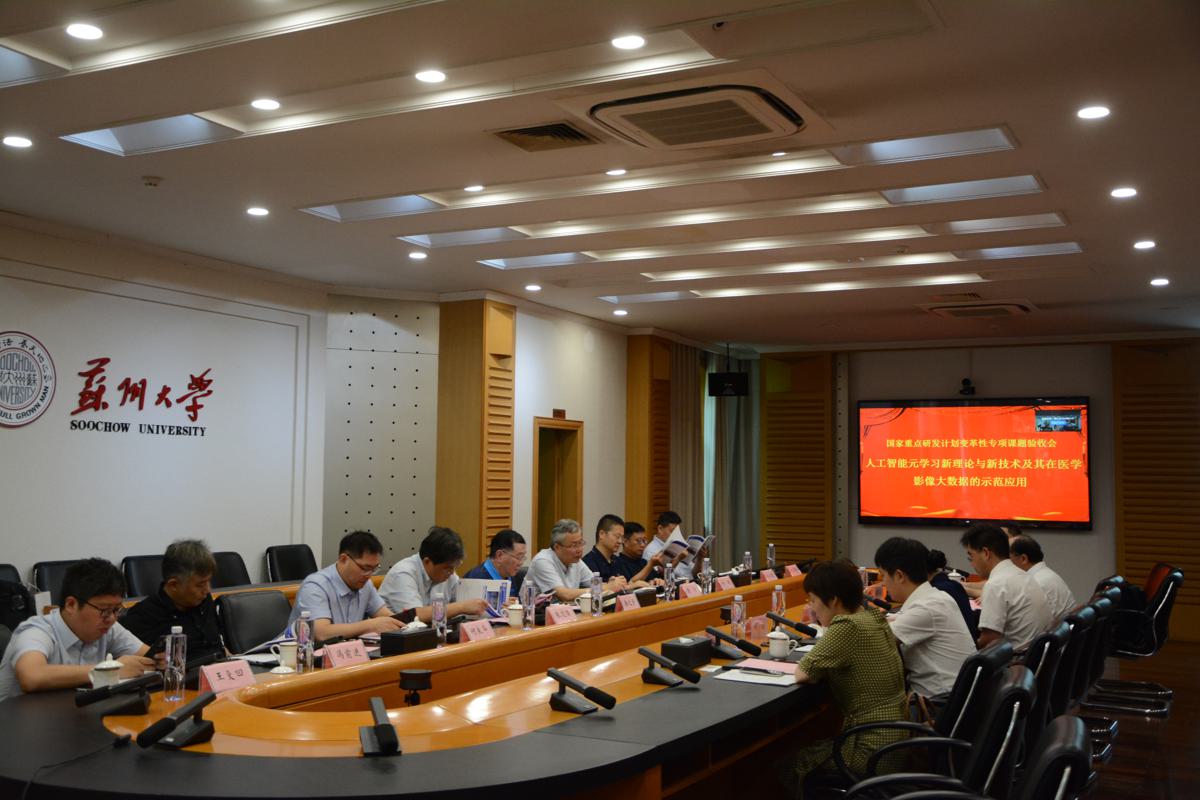 |
The meeting adopted a hybrid format, combining both online and offline methods. Ten renowned experts and scholars in the field, including Academician Chai Zhifang from Soochow University, Academician Gu Ning from Nanjing University, and Professor Zhang Yongdong from the University of Science and Technology of China, were invited to participate in this summary meeting. Vice Chancellor Wu Jiawei, Dean He Le of the Institute of Science and Technology, Secretary Yuan Dongmei of our institute, and project leaders such as Professor Li Fanchang from Soochow University and Professor Zhang Zhiqiang from Nanjing University also attended the meeting.。
At the meeting, Vice Chancellor Wu Jiawei first delivered a speech on behalf of the university. She warmly welcomed all the expert scholars and introduced the strong commitment and emphasis that Soochow University places on academic and scientific research development. She also highlighted and affirmed the scientific achievements of the Medical Image Processing and Analysis Laboratory led by Professor Chen Xinjian. Finally, Chancellor Wu sincerely thanked the experts for their comprehensive support to the university's research efforts and wished for the complete success of this project acceptance meeting.
|
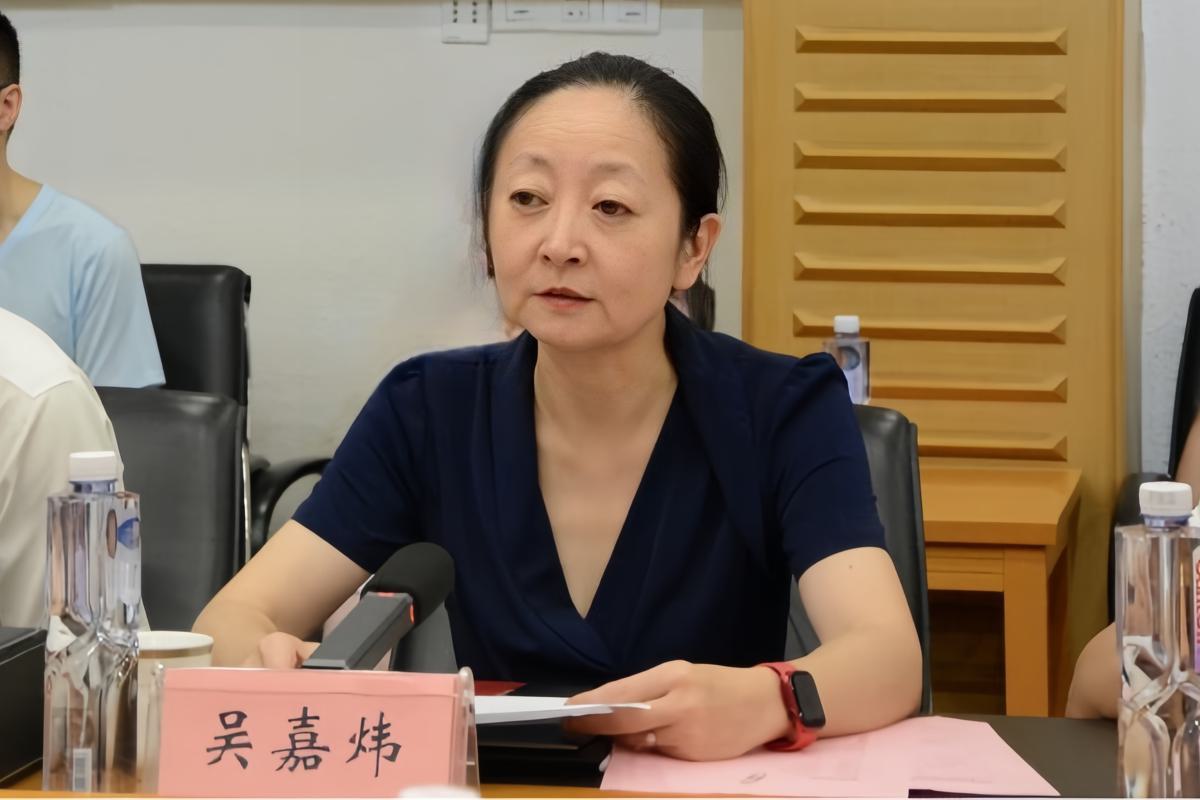 |
Following Vice Chancellor Wu Jiawei's opening remarks, Academician Chai Zhifang and Academician Gu Ning each delivered a speech. Academician Chai expressed that he had participated in the project discussions multiple times and was very concerned about the progress and implementation of the project. He encouraged all experts to actively engage in discussions and share their valuable opinions to further enhance the project's summary and conclusions. Academician Gu Ning began by thanking the project team for their invitation and encouraged everyone to learn together. He hoped that all participants would actively discuss the challenges and shortcomings of the project and wished the project team increasing success in their future endeavors.
|
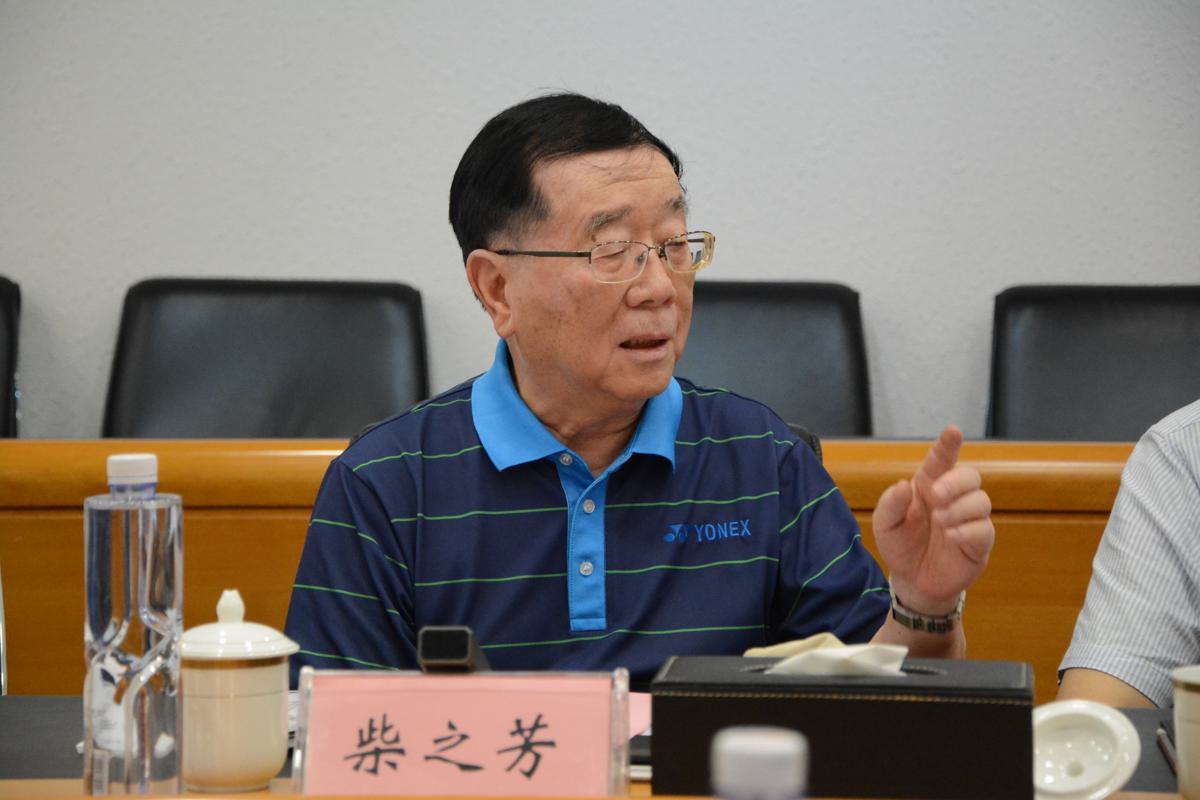 |
 |
During the meeting, Professor Chen Xinjian from our institute, Professor Li Fanzhang from the School of Computer Science, and Professor Zhang Zhiqiang from Nanjing University, as the project leaders, presented their project summaries to the experts in attendance. Professor Li Fanzhang summarized his work from the theoretical framework of Lie Group Bayesian Manifold Meta-Learning; Professor Chen Xinjian summarized his work from the methodological perspective of Lie Group Bayesian Manifold Meta-Learning; and Professor Zhang Zhiqiang summarized his work on the self-inferencing medical imaging diagnostic system based on Lie Group Bayesian Manifold Meta-Learning.
|
 |
The experts present at the meeting fully affirmed the progress of the three projects and offered constructive feedback on the content and format of the presentations. Academician Gu Ning emphasized the importance of highlighting the main themes and focusing on key points in the summaries. Academician Chai Zhifang suggested that the presentations should closely link the three projects and demonstrate the "transformative" nature of the project through landmark achievements. Professor Zhang Yongdong, the project's responsible expert, recommended organizing and categorizing the results effectively, highlighting signature achievements to underscore their international impact. Other attending experts also fully recognized the achievements of the project assessments and provided comprehensive guidance on the key points for the final stages of the project, offering practical and effective advice and suggestions.
|
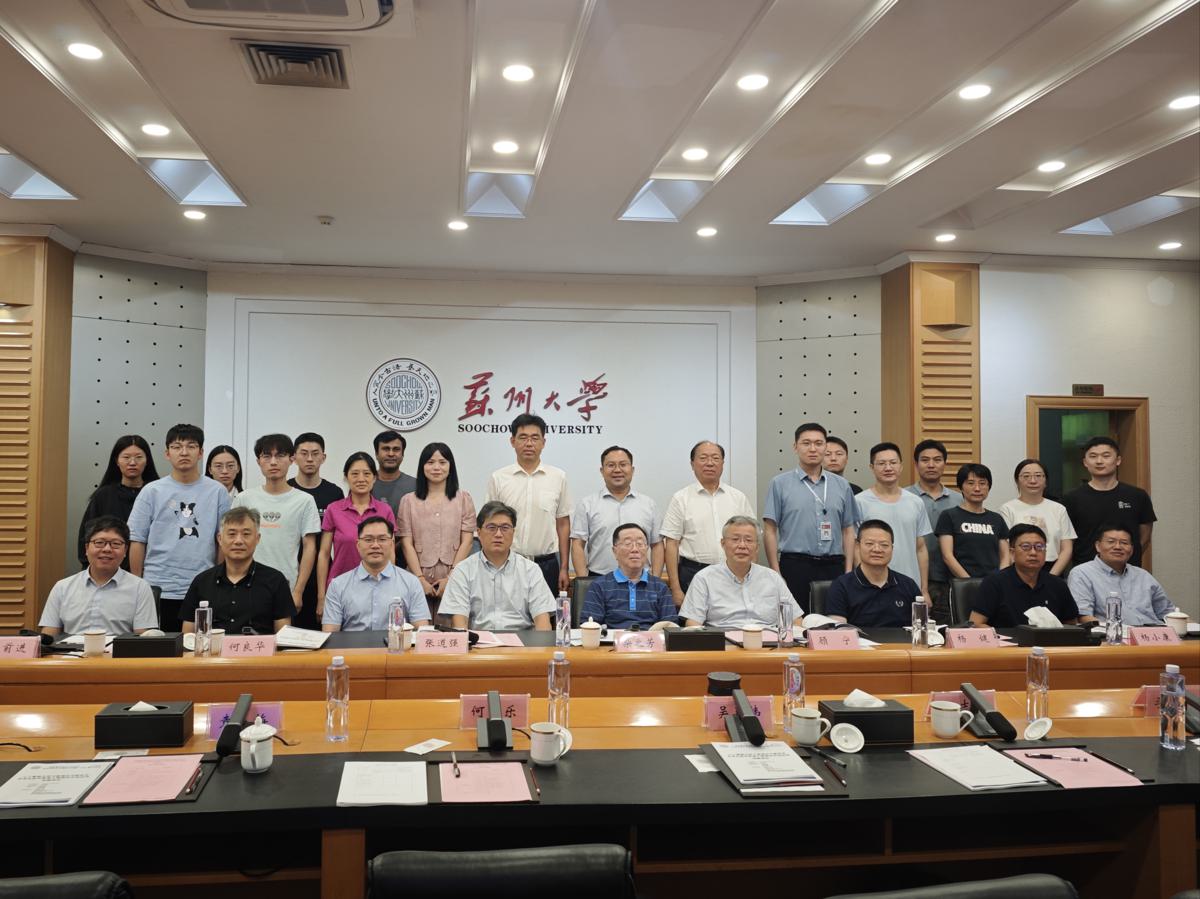 |
With the strong support of the experts and leaders, the acceptance meeting for the project "New Theories and Technologies in AI Meta-Learning and Their Demonstration Applications in Medical Imaging Big Data" under the National Key Research and Development Program on "Key Scientific Issues in Transformative Technologies" was successfully completed. The project team will continue to focus on national strategic needs, deepen interdisciplinary integration, persist in integrated scientific and technological innovation, collaboratively overcome core key technologies, and accelerate the application and transformation of AI technology research achievements in the field of smart healthcare. This effort will support the high-quality development of the institution and benefit the health and well-being of the people.
|
| The 5th Suzhou International Medical Imaging Symposium and the 3rd Suzhou International Ophthalmology Artificial Intelligence Forum were successfully held. |
 |
From November 11 to 12, 2023, the 5th Suzhou International Medical Imaging Symposium and the 3rd Suzhou International Ophthalmology Artificial Intelligence Forum, co-hosted by the Medical Image Processing and Analysis Laboratory of the School of Electronic and Information Engineering at Soochow University and the National Clinical Research Center for Ocular Diseases, were successfully held in the Academic Lecture Hall of Binglin Hall at Soochow University. The conference aimed to promote discussions and collaborations among scholars, clinicians, engineers, and industry professionals from both domestic and international communities, advancing research, achievement transformation, and future development in medical imaging and ophthalmic artificial intelligence. The conference invited numerous renowned scholars in the field of medical imaging and distinguished ophthalmology experts for academic sharing. Special invitations were extended to Professor Xu Xun from Shanghai First People's Hospital, Professor Tian Jie from Beihang University, Professor Milan Sonka from the University of Iowa, and Distinguished Professor Chen Xinjian from Soochow University, who jointly served as the chairpersons of the conference.
|
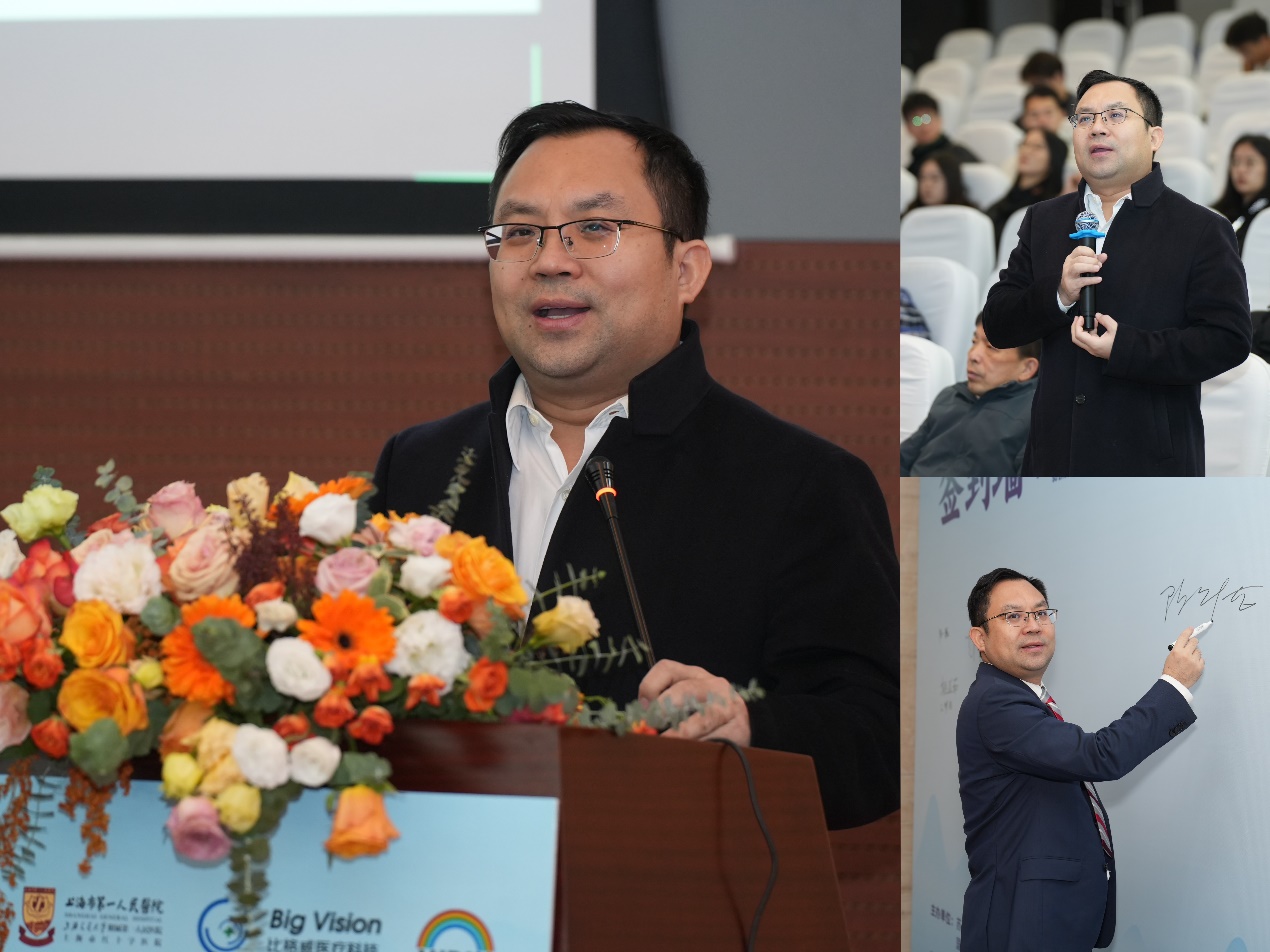 |
The conference invited top experts and scholars from various fields to focus on key issues such as medical imaging, processing, and ophthalmic artificial intelligence, discussing the integration of artificial intelligence with medicine. A total of 28 experts delivered academic presentations.
IEEE Fellow and Professor Milan Sonka from the University of Iowa delivered a keynote speech on hybrid analysis methods for retinal OCT; Optica Fellow and Professor Hao F. Zhang from Northwestern University presented a keynote on visible light OCT imaging and its applications.
Professors Yali Jia from Oregon Health & Science University, Ulas Bagci from Northwestern University, Junwei Han from Northwestern Polytechnical University, Xia Wu from Beijing Normal University, Yang Li from Beihang University, Jian Yang from Beijing Institute of Technology, and Director Researcher Huazhu Fu from the Agency for Science, Technology and Research (A*STAR) in Singapore, among others, shared the latest academic research achievements in the intersection of artificial intelligence and medical image analysis.
Professors Yang Chen from Nanjing University, Huafeng Liu and Dan Wu from Zhejiang University, and Dong Liang from the Shenzhen Institutes of Advanced Technology, Chinese Academy of Sciences, among other experts, delivered specialized reports on advanced imaging methods for CT, PET, and MRI, incorporating artificial intelligence.
Professors Haidong Zou from Shanghai First People's Hospital, Ying Jie from Beijing Tongren Hospital, and Jin Yuan from Zhongshan Ophthalmic Center, along with other clinical experts, delivered specialized reports on the empowerment of clinical practice through artificial intelligence and information technology. |
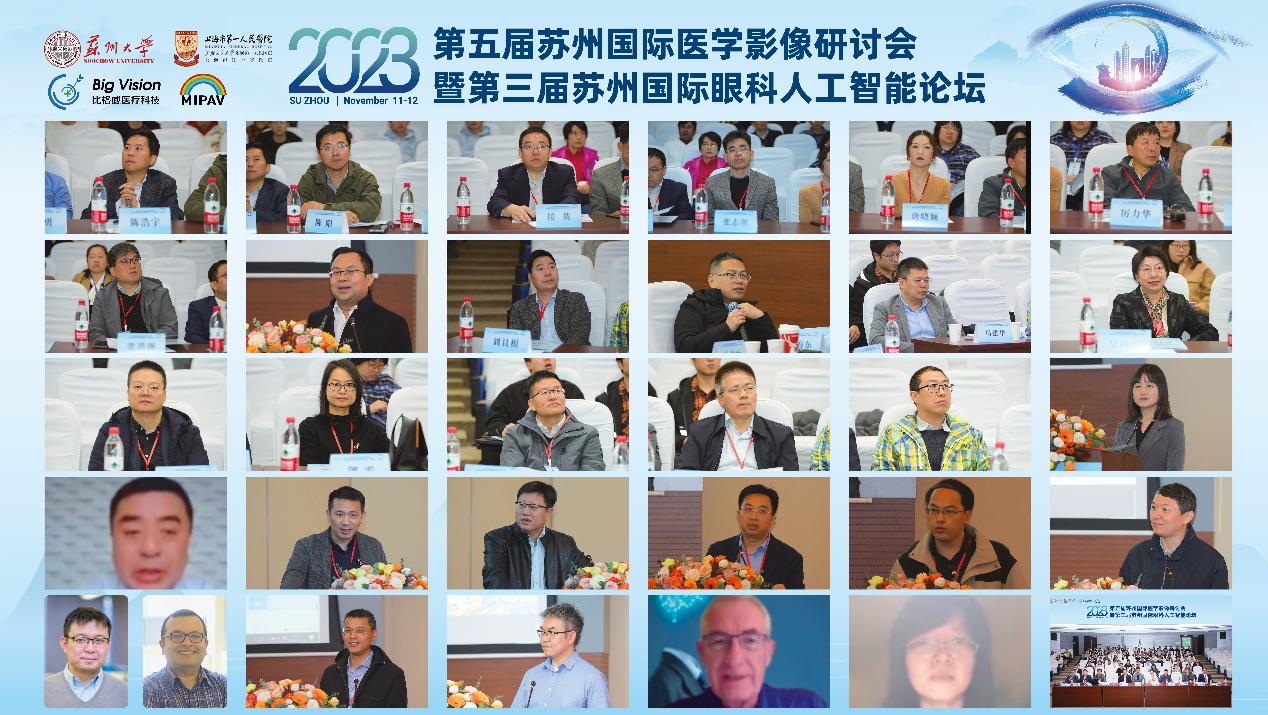 |
In the final discussion session chaired by Professor Xinjian Chen, the attending experts and scholars engaged in an academic exchange on "the impact of foundational large models on medical imaging and artificial intelligence." They unanimously agreed that the emergence of foundational large models has presented challenges as well as opportunities in the field of medical imaging.
The conference was successfully held, attracting the participation of numerous professional scholars from both domestic and international communities. It showcased the latest developments in artificial intelligence-enabled medical imaging, playing a positive role in promoting the integration of industry, academia, and research, as well as international exchanges. |
| 2022 MIPAV Lab successfully held the 2nd Suzhou International Ophthalmic Artificial Intelligence Forum |
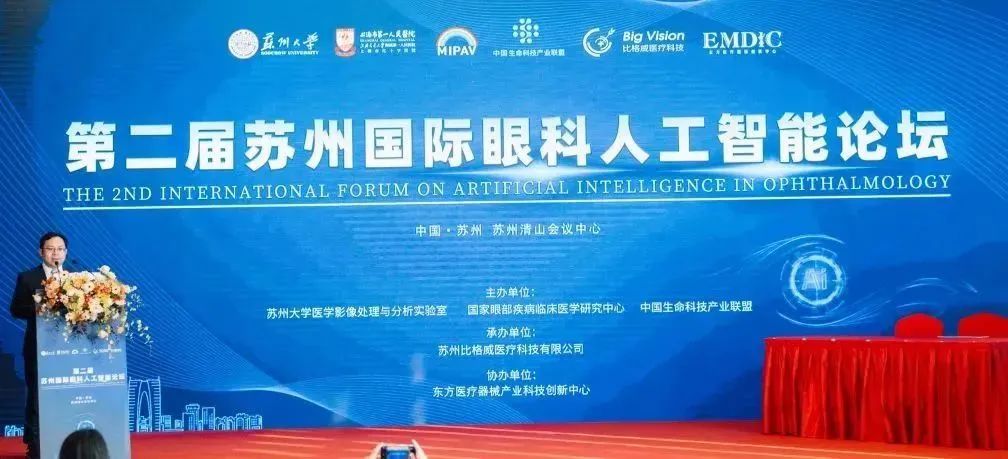 |
On November 26, 2022, the 2nd Suzhou International Ophthalmic Artificial Intelligence Forum was held in Suzhou, China. The meeting was co-organized by the Medical Image Processing, Analysis and Visualization Laboratory of Soochow University, the National Clinical Medical Research Center for Eye Diseases, and the China Life Science and Technology Industry Alliance, and hosted by Suzhou Big-Vision Medical Technology Co.
|
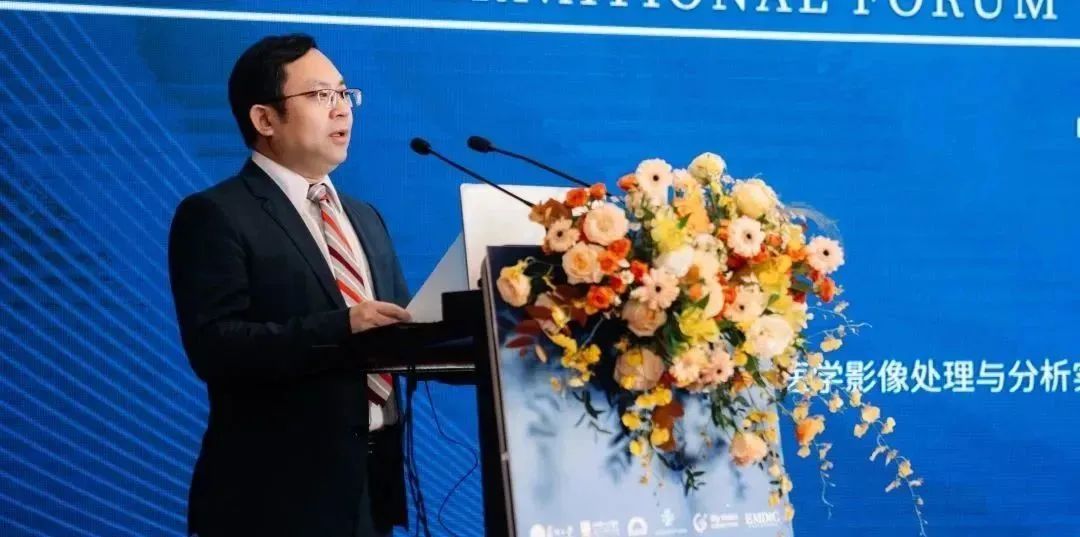 |
|
The conference invited many famous scholars and renowned ophthalmologists from home and abroad in the field of AI to share their academic knowledge, especially invited Professor Xun Xu from Shanghai First People's Hospital, Professor Milan Sonka from the University of Iowa, USA and Distinguished Professor Xinjian Chen from Soochow University and founder of Big-Vision Medical Technology to give opening speeches.
|
 |
|
The forum lasted for two days, with 19 experts sharing their academic experiences on the first day. Among them, Soochow University and Big--Vision Medical Technology Xinjian Chen gave a keynote speech on artificial intelligence diagnosis of ophthalmic OCT images, detailing the latest research results of artificial intelligence algorithms in the field of ophthalmic OCT and the relevant transformation results of Big--Vision Medical.Professor Wenbin Wei of Beijing Tongren Eye Center gave a keynote speech on small eyes and big health based on artificial intelligence to achieve early warning of eye and systemic diseases, sharing in detail the application scenarios of artificial intelligence in the field of ophthalmology and saying that artificial intelligence is the core support for future medical development.Prof. Shipo Tang from Aier Ophthalmology introduced the application of new generation imaging technology in the diagnosis and treatment of fundus disease; Prof. Haoyu Chen from Shantou University - Chinese University of Hong Kong Shantou Eye Center gave a keynote speech on artificial intelligence based choroidal thickness estimation, etc.The forum also invited some foreign scholars to share: Professor Milan Sonka from the University of Iowa gave a keynote speech on 3D Analysis of Retinal OCT: Layers, Choroid, Fluid Pathologies; Professor Xincheng Yao from the University of Illinois at Chicago shared Machine learning for differential artery-vein analysis in OCT angiography and so on.
There were 15 experts exchanging and sharing on the second day. Among them, Prof. Kang Zhang from the Macau University of Science and Technology (MUST) gave a keynote speech on big data artificial intelligence for ophthalmology disease diagnosis and treatment and innovative drug development, sharing the application results of precision diagnosis and treatment in the scenarios of ophthalmology, stem cells, medical artificial intelligence drug development and medical macrohealth from MUST and MUST affiliated hospitals.Professor Youxin Chen from Peking Union Medical College Hospital gave a keynote speech on multi-disease diagnosis and triage based on fundus imaging technology AI, and gave a detailed introduction on how AI + fundus camera can help fundus disease screening and health management.Professor Xiaofeng Zhang from the First Hospital of Soochow University gave a wonderful academic sharing on the diagnosis and differential diagnosis of early cone cornea; Professor Weifang Zhufrom Soochow University gave a keynote speech on the processing and analysis research of fundus images of high myopia. Professor Yanwu Xufrom Baidu shared the first national Class III certificate for glaucoma AI medical device from scientific research to implementation; Professor Xun Xu from Shanghai First People's Hospital gave a speech on the application of eye axis measurement in myopia prevention and control, sharing the use of artificial intelligence in myopia prevention and control, etc.
|
| Roundtable Discussion |
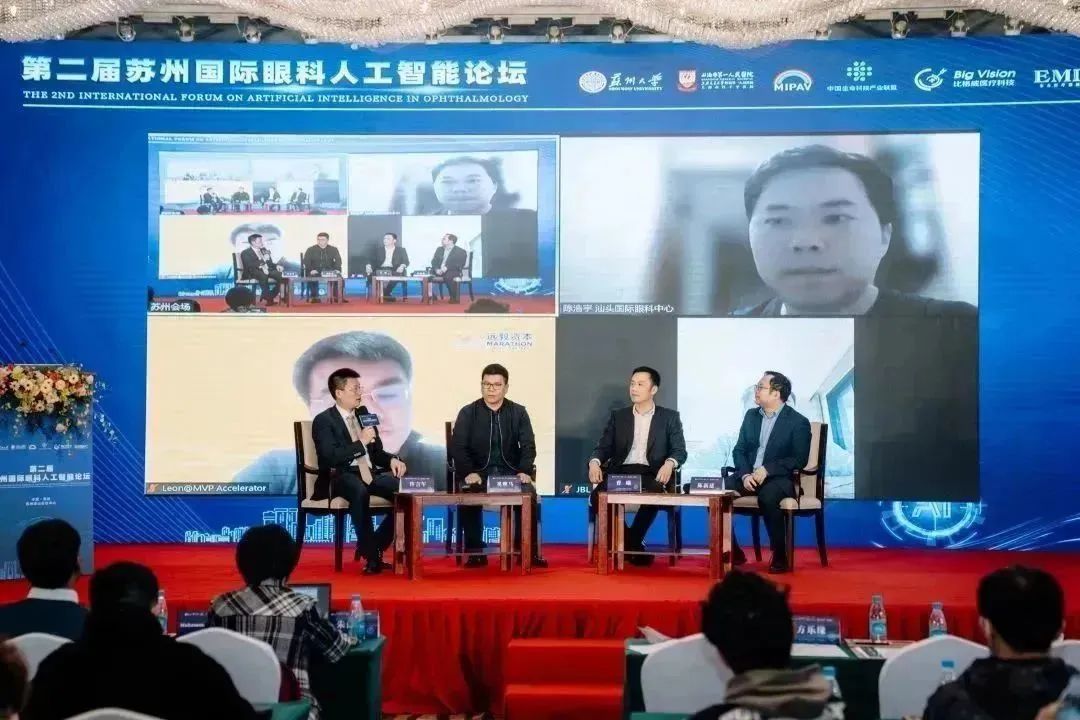 |
|
The final session of the conference - "The Development and Challenges of Ophthalmic AI" roundtable discussion brought the conference to a climax. Two representatives from investment institutions, Xi Cao from Yisheng Capital and Yang Li from Yuan Yi Capital, together with Prof. Xun Xu , Prof. Haoyu Chen, Prof. Jin Yuan, Prof. Yanwu Xu, Prof. Jima Xi and Prof. Xinjian Chen, focused on the new direction and characteristics of ophthalmic AI research; the clinical value and application of multimodal ophthalmic AI; the role of ophthalmic AI in new drug development and systemic chronic diseases; how to establish a grassroots community screening system for ophthalmic AI. Shanghai and Shenzhen have released the Regulations on the Promotion of Artificial Intelligence Industry, Hainan has accelerated the promotion of digital therapy, how far is the spring of ophthalmic AI charges; opportunities and risks of investment in ophthalmic AI track 6 topics, the technical frontier of ophthalmic AI hotspots, application prospects and remaining technical problems were discussed with inspiration and foresight, wisdom collision let everyone enjoy the feast of ideas.
|
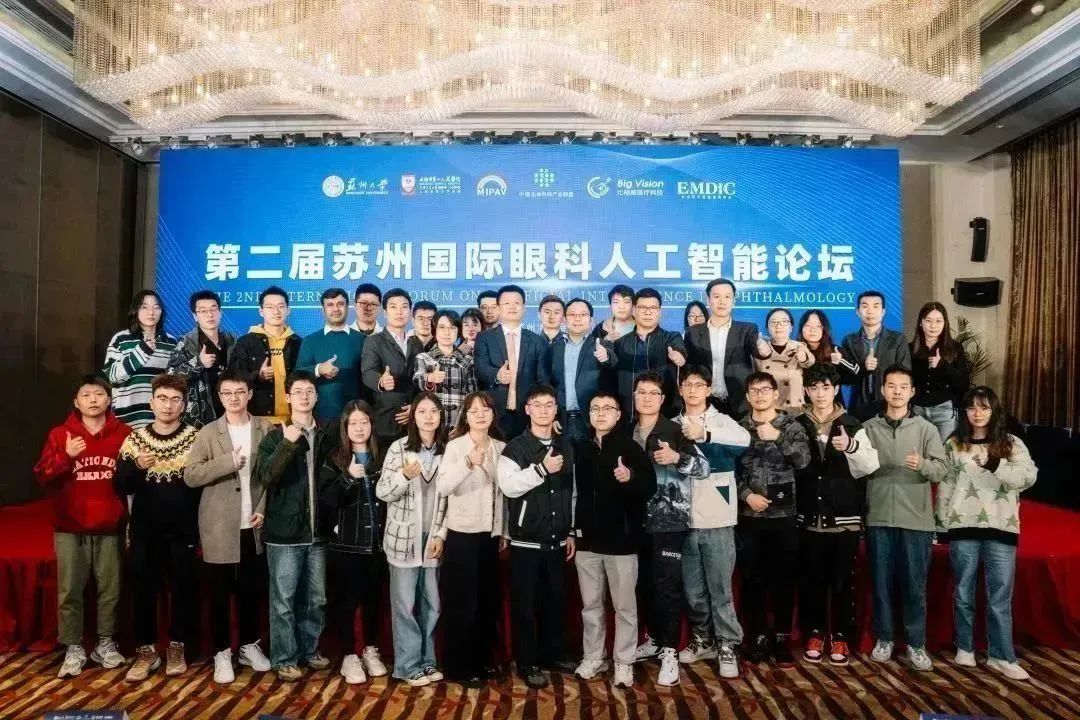 |
|
The conference was successfully concluded. In the future, Suzhou International Ophthalmic AI Forum will continue to build academic forums on AI themes, invite more ophthalmology colleagues from home and abroad, focus on hot issues, exchange cutting-edge technologies, build a high-level academic exchange platform in the field of ophthalmic AI, and empower ophthalmic treatment with AI.
|
| The 2022 Annual Summary Meeting of the National Key R&D Program "Key Scientific Problems of Transformative Technologies" undertaken by Prof. Xinjian Chen's team was successfully held |
|
On the morning of Nov. 24, 2022, "New Theory and Technology of Artificial Intelligence Meta-Learning and its Demonstration Application in Medical Imaging Big Data", a key project of the National Key R&D Program "Key Scientific Problems of Transformative Technologies" undertaken by Prof. Xinjian Chen's team, was successfully held in Suzhou. The annual summary meeting was successfully held in Suzhou. Prof. Xinjian Chen, the project leader, chaired this meeting.
|
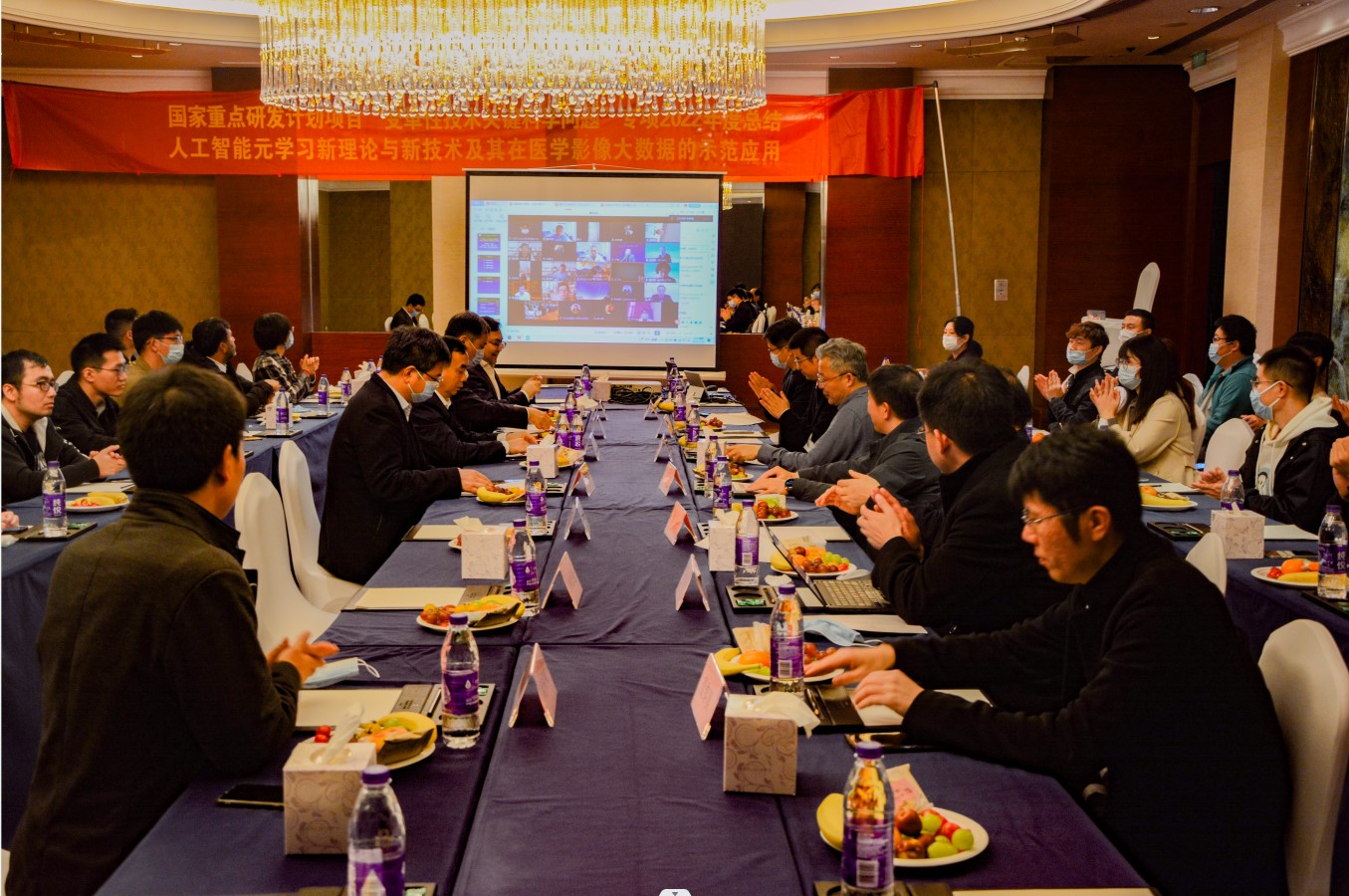 |
|
The meeting was held in a combination of offline and online, and 25 renowned experts in the field were invited to attend, including academician Peiheng Wu from Nanjing University, academician Zhifang Chai from Soochow University, academician Ning Gu from Nanjing University and Professor Jie Tian from Beijing University of Aeronautics and Astronautics. President Xiaohong Zhang, Executive Vice President Fuliang Qian and Director Kaiqiang Liu of the Institute of Science and Technology, as well as project team Prof. Fanchang Li of Soochow University, Prof.Zhiqiang Zhang of Nanjing University and Prof.Lihua Li of Hangzhou University of Electronic Science and Technology attended the meeting.
At the meeting, President Xiaohong Zhang firstly delivered a speech on behalf of the project undertaking unit, thanking everyone for their support and help in all aspects of the school's work, placing great expectations on the development of the project, and subsequently the school will continue to fully cooperate to ensure the smooth implementation of the project. After that, Academician Peiheng Wu, Academician Zhifang Chai and Academician Ning Gu delivered their speeches and wished the meeting a complete success.
Prof. Xinjian Chen, as the project leader, reported the overall annual progress of the project. Focusing on the annual tasks, the project team has steadily promoted the research work in three aspects: the study of the theoretical framework of Lie group-Bayesian fluidic meta-learning, the study of a new method of Lie group-Bayesian fluidic meta-learning, and the study of an efficient meta-learning self-inferential medical image diagnosis system, and achieved a series of results. Professor Fanchang Li from School of Computer Science, Soochow University and Professor Zhiqiang Zhang from Nanjing University, as the project leaders, reported the progress and research results of this year's project to the experts.
The experts gave full affirmation to the progress of the project and gave guidance for the follow-up research of the project. Academician Peiheng Wu pointed out that the research content and objectives of the project have great development significance, and efforts are needed to overcome more technical problems and further solve the existing key problems. Academician Zhifang Chai said the project is oriented to people's health, the research direction is very good, and good results have been achieved so far, and he has high hopes for the future development of the project. Academician Ning Gu expressed that the project is very challenging and has strong potential at the same time, and expressed his deep hope for the further deep integration of theory and application. Other experts also expressed their full affirmation of the annual work of the project, and gave multi-faceted guidance on the next work points of the project, and put forward practical and effective opinions and suggestions.
|
 |
|
The meeting marked the successful completion of the 2022 annual work summary of the National Key Research and Development Program "Key Scientific Problems of Transformative Technologies" key project "New Theory and Technology of Artificial Intelligence Meta-Learning and its Demonstration Application in Medical Imaging Big Data". The project team will continue to face the major national needs, deepen the cross-fertilization of disciplines, adhere to the integrated scientific and technological innovation, cooperate to overcome the core key technologies, accelerate the promotion of artificial intelligence technology research results in the field of intelligent medical landing and transformation, to help the university's high-quality development, for the benefit of people's health.
|
| Congratulations to the Suzhou Biomedical Electronic Technology Laboratory for being awarded the outstanding ranking of the Suzhou Key Laboratory of Discipline Evaluation in 2021 |
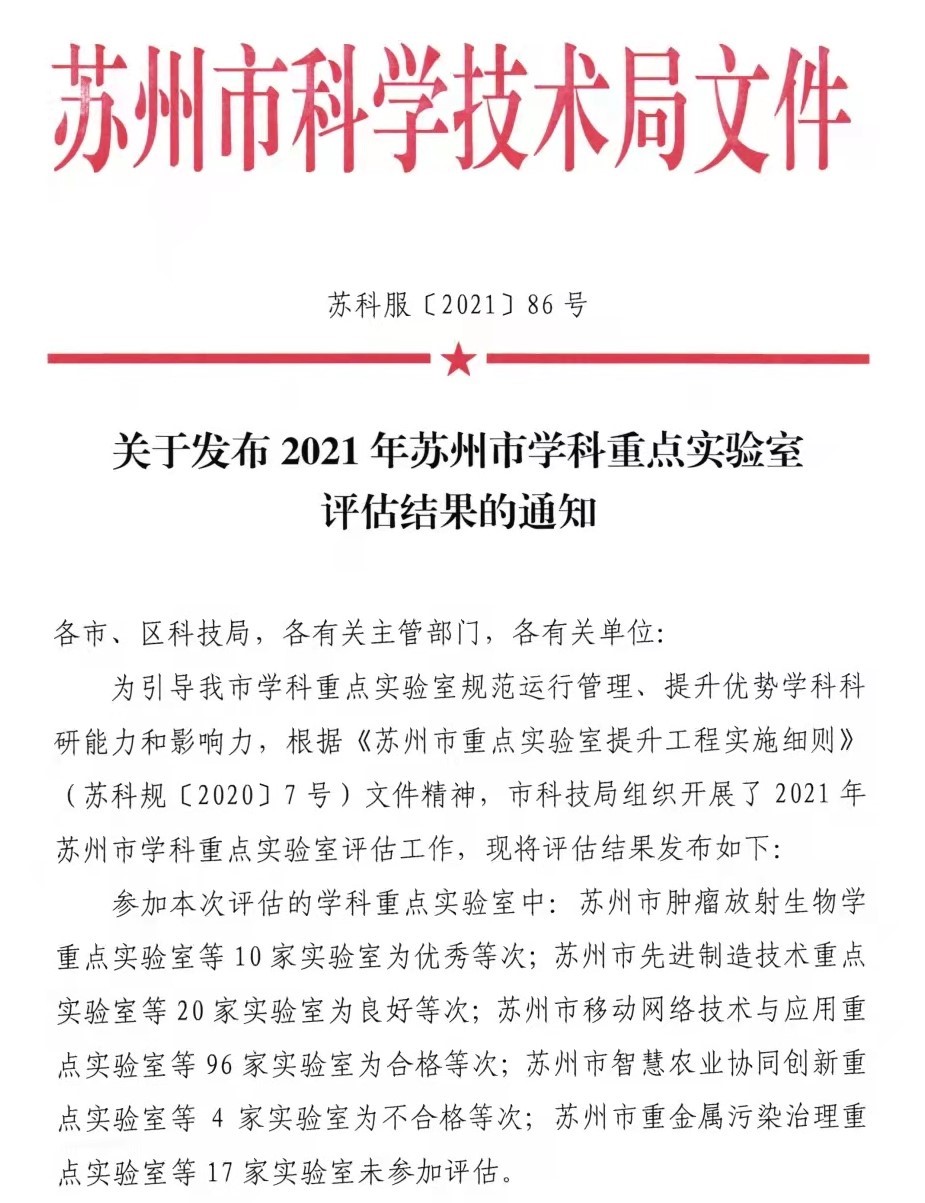 |
|
Recently, the Suzhou Science and Technology Bureau announced the evaluation results of the Suzhou Key Laboratory of Subjects in 2021. The Suzhou Biomedical Electronic Technology Laboratory of Soochow University was awarded the Excellent Class. A total of 130 subject key laboratories participated in this assessment. Among them, 10 laboratories are rated as excellent; 20 laboratories are rated as good; 96 laboratories are rated as qualified; 4 laboratories are rated as unqualified.
|
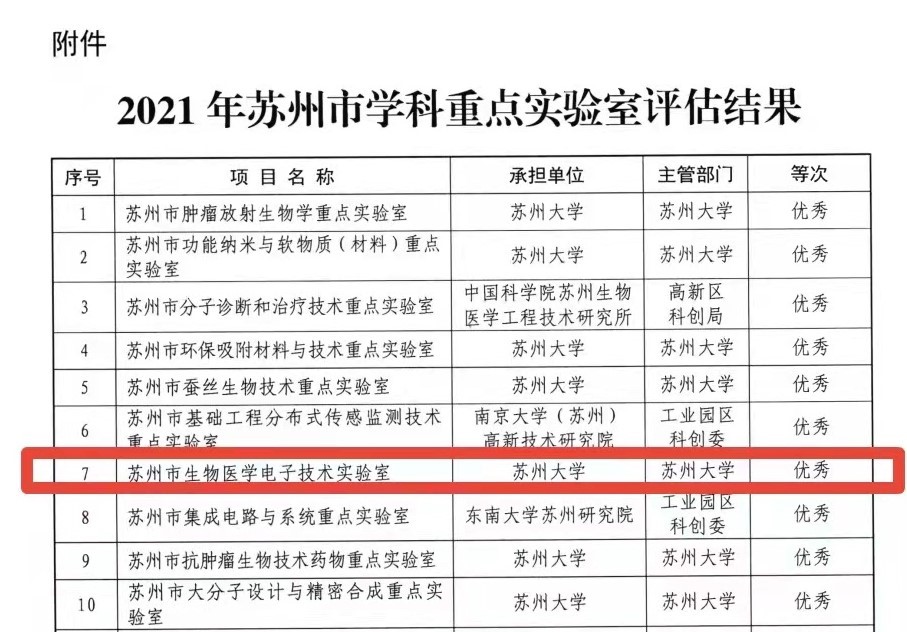 |
|
The Suzhou Biomedical Electronic Technology Laboratory of Soochow University, under the leadership of Professor Chen Xinjian, has carried out in-depth research on medical image processing and analysis, biomedical imaging technology, biomedical signal processing, neural information and engineering, and voice signal processing. Improve innovation capabilities and operational management levels, and give full play to the backbone role of laboratories in gathering and cultivating outstanding talents, undertaking major scientific research tasks, and producing high-level innovation results. In the past five years, the laboratory has undertaken more than 20 national, provincial and ministerial-level and municipal-level projects such as national key research and development projects and key projects of the National Natural Science Foundation, with a total scientific research funding of more than 30 million; won the 2018 Jiangsu Science and Technology Award II 1 first prize and 1 third prize each, 1 first prize of the 2020 Wu Wenjun Artificial Intelligence Technology Invention Award; published more than 150 international and domestic authoritative journal papers, including IEEE Transactions on Image Processing, IEEE Transactions on Medical Imaging and other fields Published more than 30 papers, published more than 100 conference papers, authorized more than 30 invention patents, and transferred more than 10 patent rights.
In the future, Suzhou University Suzhou Biomedical Electronic Technology Laboratory will further explore new methods and new technologies, and contribute to the rapid development of Suzhou and the country's health industry.
|
| The 2019-2020 annual summary meeting of the key special projects of the national key research and development plan of Professor Chen Xinjian's team was successfully held |
On the afternoon of November 17, the national key research and development plan transformative technology, key scientific issues and key special projects "Artificial intelligence meta-learning new theories and new technologies and their demonstration applications in medical imaging big data" 2019-2020 annual summary meeting in the Red Building Conference Center of the headquarters Convened. Professor Chen Xinjian from the School of Electronic Information presided over the meeting as the project leader.
The conference invited 21 well-known experts in the field including Academician Chai Zhifang of the Chinese Academy of Sciences, Director Wu Gen of the High Technology Center of the Ministry of Science and Technology, Professor Zhang Yongdong from the Institute of Computing Technology of the Chinese Academy of Sciences, Professor Han Yan from North University of China. Vice President Zhang Xiaohong, Minister Yu Qiuya of the Ministry of Science and Technology, Director Qian Fuliang of the Department of Science and Technology, Professor Hu Jianling, Secretary of the Party Committee of the School of Electronics and Information, and Professor Li Fanchang of the project team, Professor Zhang Zhiqiang from Nanjing University, Professor Li Lihua of Hangzhou Dianzi University, Shantou University Hong Kong Chinese Professor Chen Haoyu of the University United Eye Hospital and Yan Wentao, director of the Eye Optometry Hospital of Wenzhou Medical University, also attended the meeting.
|
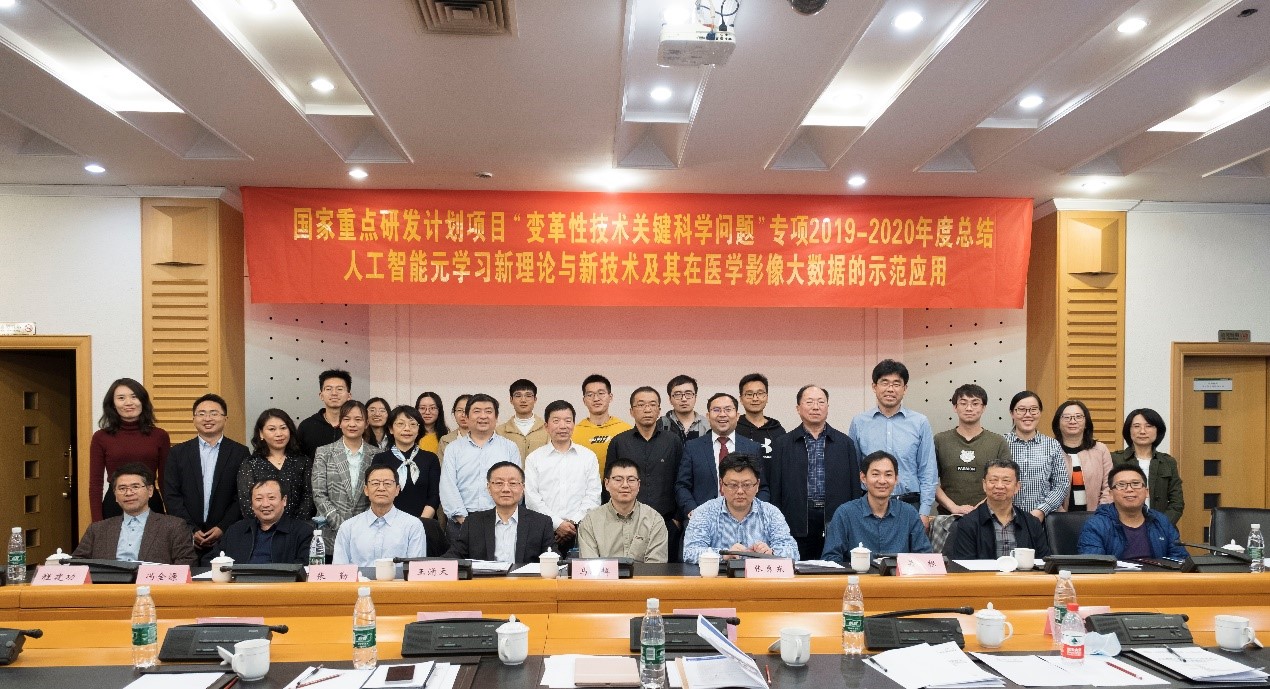 |
At the meeting, Professor Chen Xinjian introduced the overall annual progress as the project leader. Deep learning has major problems in the application of complex and uncertain scenes, and transformative machine learning technology is urgently needed. Lie group-Bayesian manifold meta-learning can effectively and accurately represent complex uncertain scenes, with "whole + partial, qualitative + quantitative , Linear + non-linear, single parameter + multiple parameters" and other advantages, the Lie group-Bayesian manifold meta-learning theoretical framework is a revolutionary innovation. The project team has steadily promoted the research work in three aspects of learning new theories, new methods, and new platforms from Li Qun-Bayesian Yuan, and achieved a series of results around the annual task. |
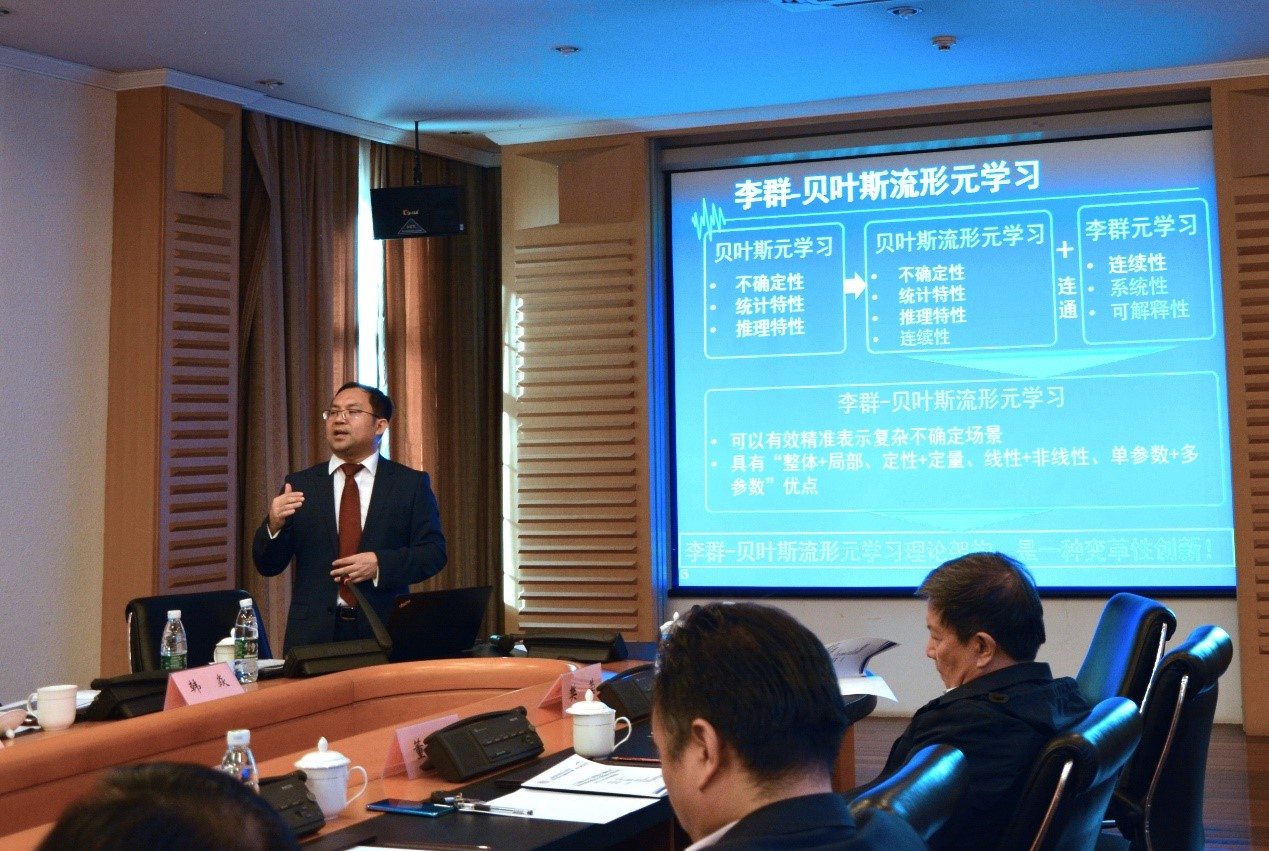 |
As the project leaders, Professor Li Fanchang from the School of Computer Science of Soochow University, Professor Chen Xinjian from the School of Electronic Information and Professor Zhang Zhiqiang from Nanjing University reported to the participating experts the progress and research results of the three sub-projects of this year's transformative project.
After the project summary report, Director Wu Gen gave a speech. He affirmed the work of the project team in the research of meta-learning theory and method and the preliminary deployment of platform construction this year, and said that the relevant units of the project should continue to work together, strengthen contacts, and further promote The existing research results are transformed into the medical application field.
|
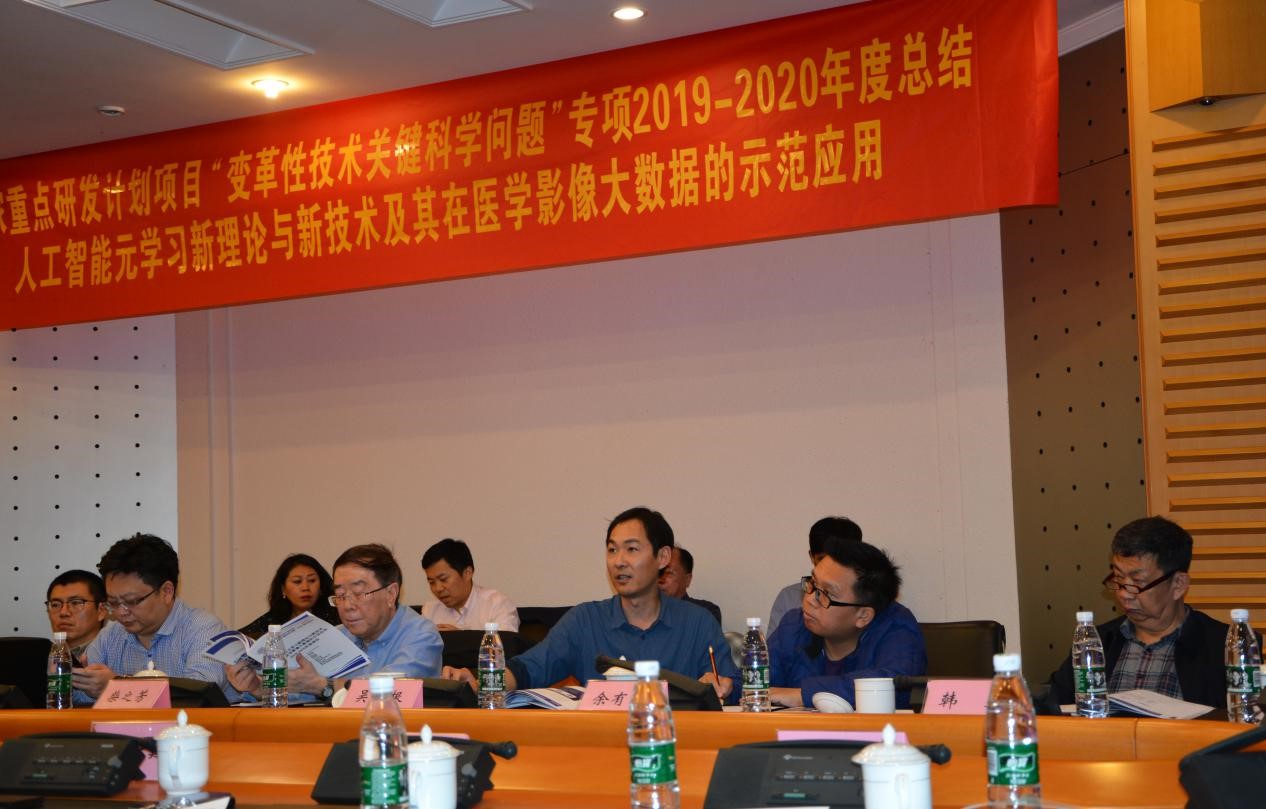 |
Later, Academician Chai Zhifang also guided the work of the project team. Academician Chai pointed out that this project is geared towards people's lives and health and is in line with the country's 11th Five-Year Plan for scientific and technological work. It has given full affirmation and earnest expectations to the key scientific issues, main research content and research objectives of this transformative technology project. |
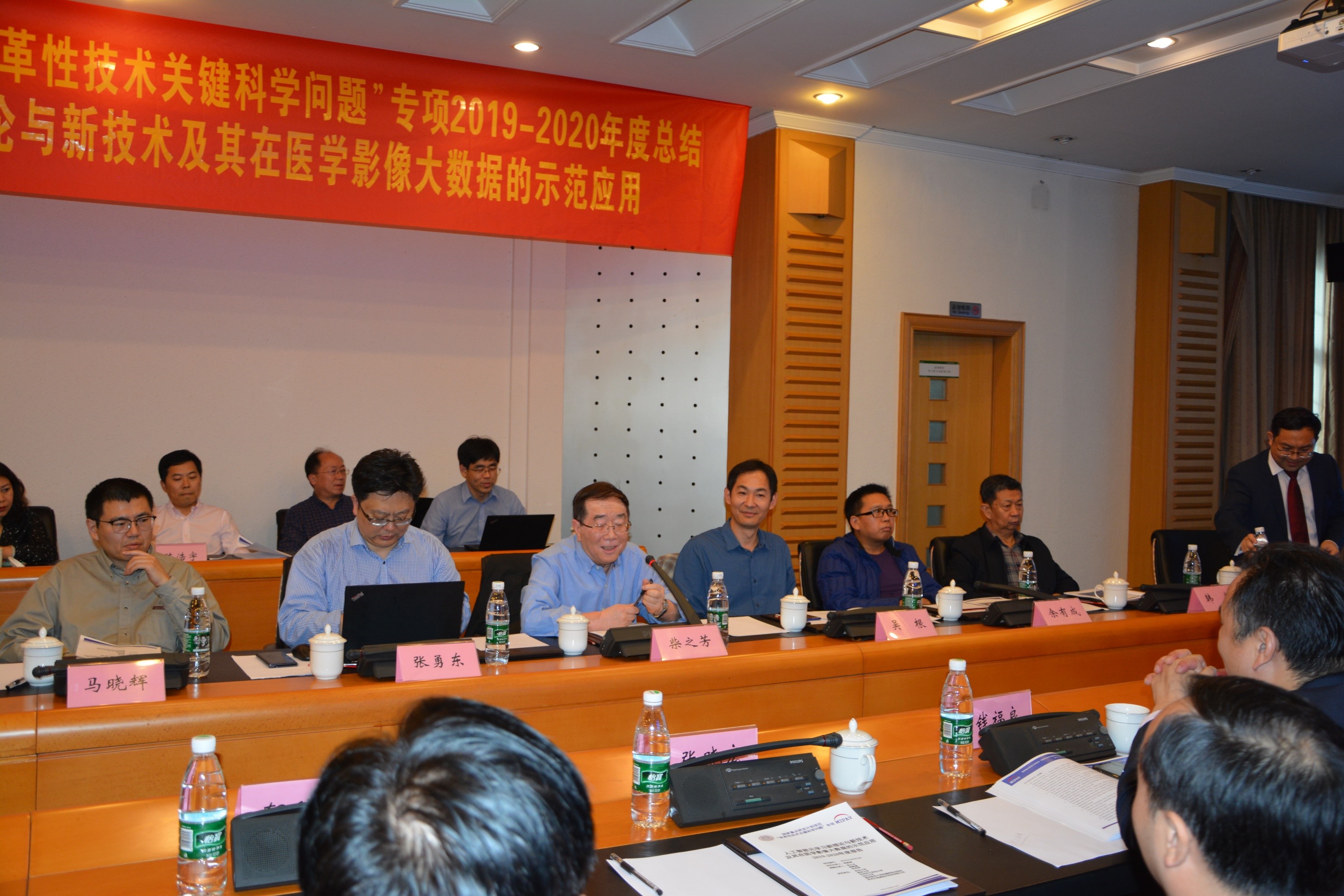 |
Project responsibility expert Professor Zhang Yongdong first affirmed the progress of the project this year, saying that the research of Li Qun-Bayesian theory has enabled meta-learning technology to be expressed concretely, promoted the development of meta-learning, and expressed the integrated development of the project’s future theory and application Ardent expectations. Other participating experts also fully affirmed the annual work of the project, provided multi-faceted guidance for the next step of the research work, and put forward effective opinions and suggestions. |
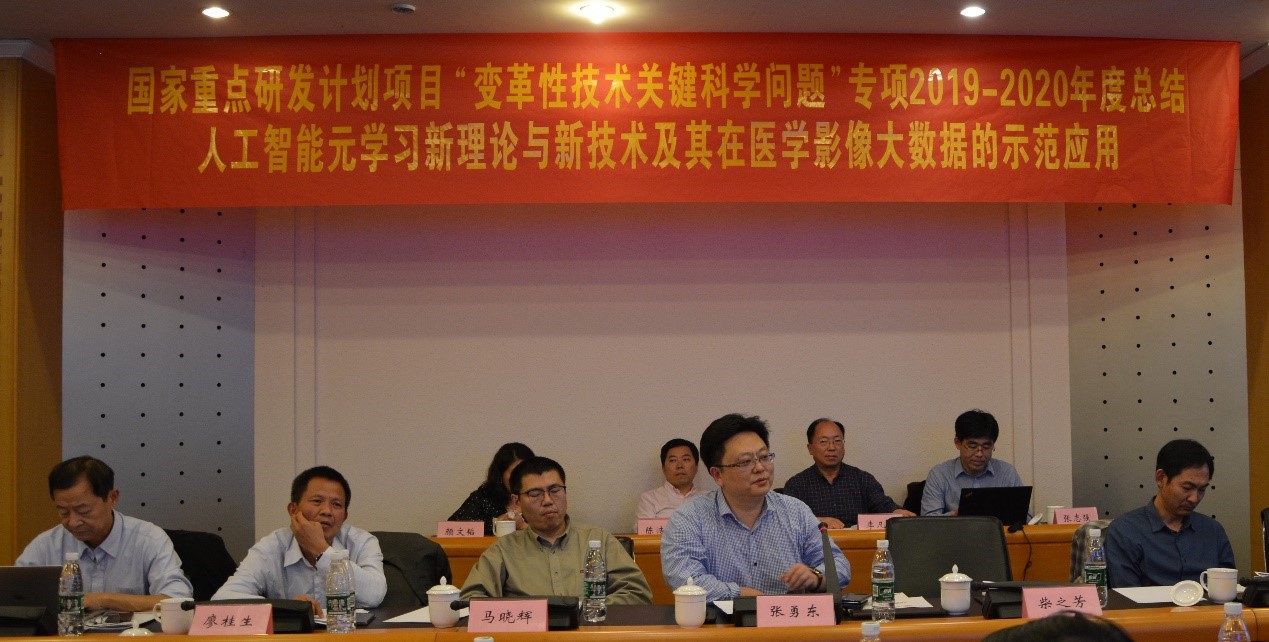 |
The convening of this conference marked the successful conclusion of the first year of the annual work summary of the key scientific issues and key scientific issues of transformative technology of the national key research and development plan "Artificial intelligence meta-learning new theories and new technologies and their demonstration applications in medical imaging big data". After the meeting, the teams of all parties immediately put into the follow-up project implementation work. Let us wish this major project a better result next year! |
| The 2020 Suzhou Medical Imaging Symposium was successfully held in the Red House Conference Center of Soochow University
|
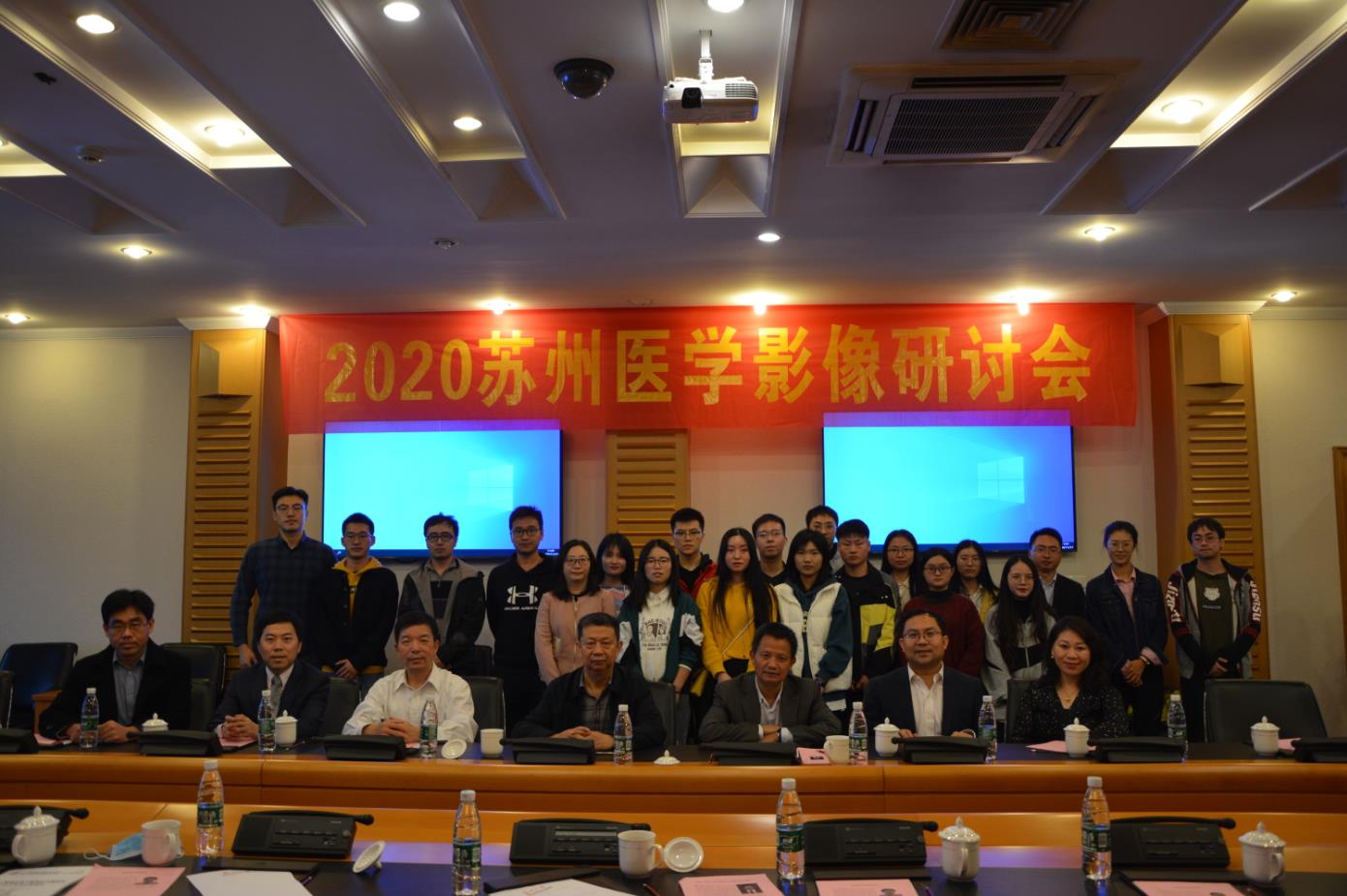 |
|
On November 17, 2020, the 2020 Suzhou Medical Imaging Symposium was successfully held in the Red House Conference Center of Soochow University. Professor Chen Xinjian, director of the Medical Image Processing and Analysis Laboratory of the School of Electronic Information, Soochow University, served as the chairman and presided over the meeting. This conference invited many experts and scholars in the field of information to exchange reports.
Professor Han Yan, winner of the National Science Fund for Distinguished Young Scholars, Chairman of the Shanxi Nondestructive Testing Society, and Vice President of North University of China, gave a report titled "Thinking of Intelligent Radiographic Imaging", and introduced the current research progress on radiographic intelligent imaging technology.
Professor Liao Guisheng, winner of the National Science Fund for Distinguished Young Scholars and Dean of the School of Electronic Engineering of Xidian University, gave a report titled "Waveform Diversity Array Radar Range Dependent Pattern Technology", introducing the theory, methods and applications of waveform diversity array radar.
Professor Li Lihua, winner of the National Science Fund for Distinguished Young Scholars, national candidate for the "New Century Hundred, Thousand, Thousand Talents Project", and Dean of the School of Life Information and Instrument Engineering of Hangzhou Dianzi University, gave a thought on "Impact (genomics) research" And some progress" report, shared the research progress and thinking related to imaging genomics and tumor precision diagnosis and treatment.
Many teachers and graduate students participated in this seminar, which opened up the research ideas of teachers and students of the college in artificial intelligence information processing, medical image diagnosis and analysis, and created a good research atmosphere.
|
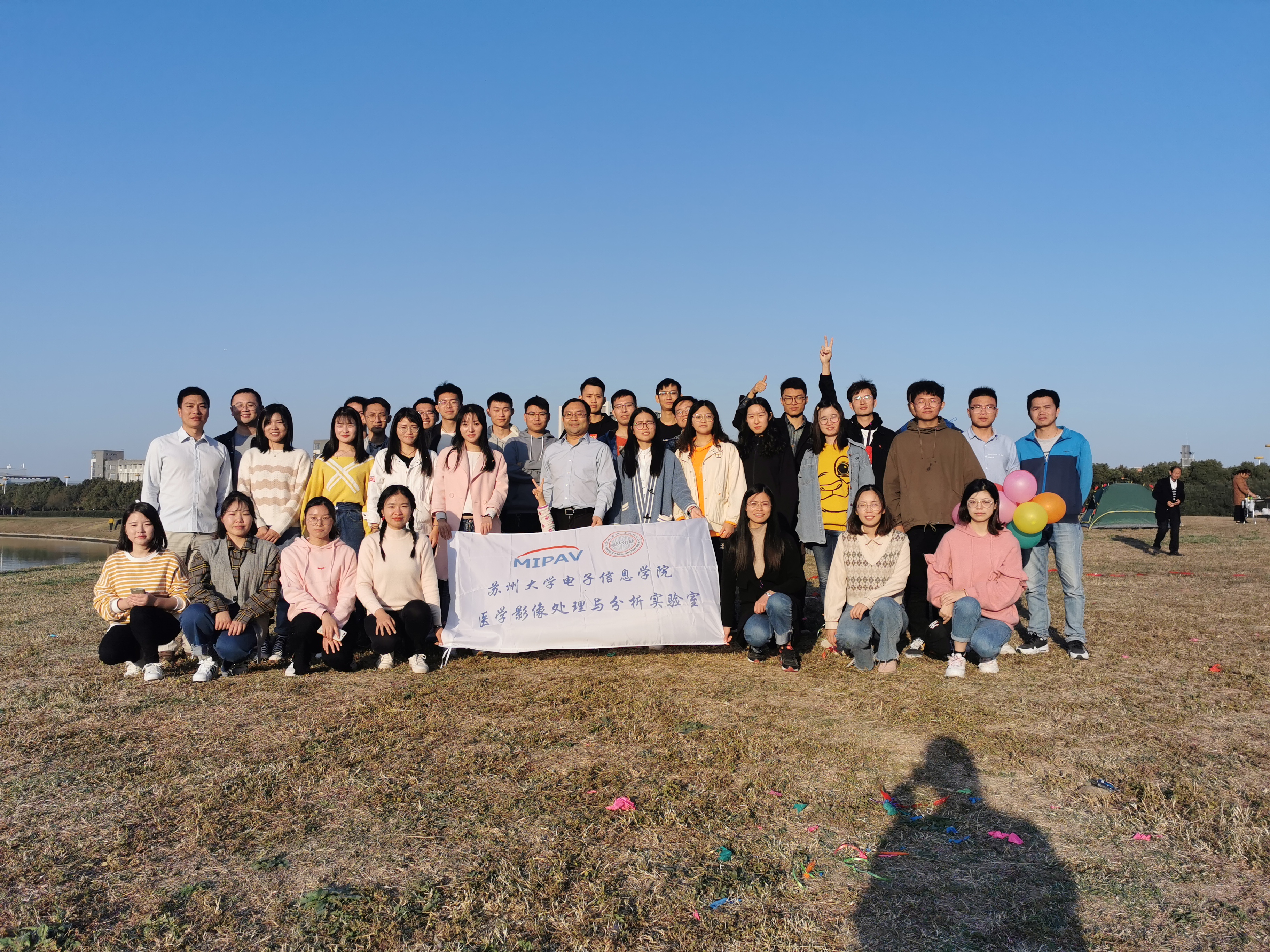 |
| An autumn visit to egret garden in dushu lake, suzhou, Nov.2019. |
 |
Professor Chen Xinjian's National Key Basic Research Development Program (973 Program) is endorsed as Excellent
【NOTICE】
【REPORT】 |
 |
| Suzhou Shangfang Mountain National Forest Park Spring Outing,May,2019. |
 |
| Professor Xie Qingguo was invited to hold an academic report at MIPAV Lab-Digital PET: LEGO for Scientist. |
 |
| Suzhou Yangcheng Lake Autumn Outing,November,2018. |
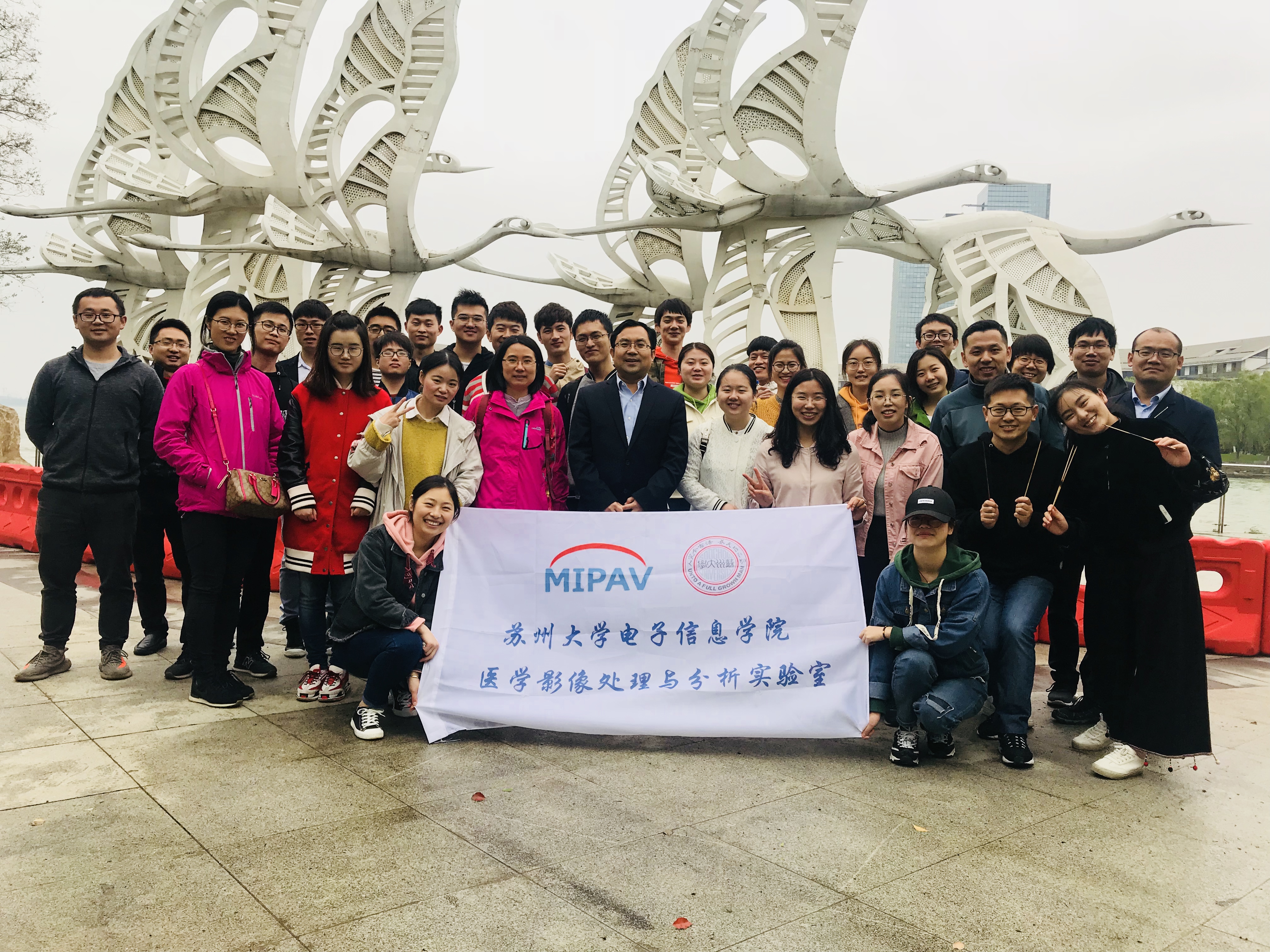 |
| Suzhou Moon Bay Park Spring Outing, April,2018 |
 |
| The Spring Tour at Baimajian in Suzhou, April, 2016 |
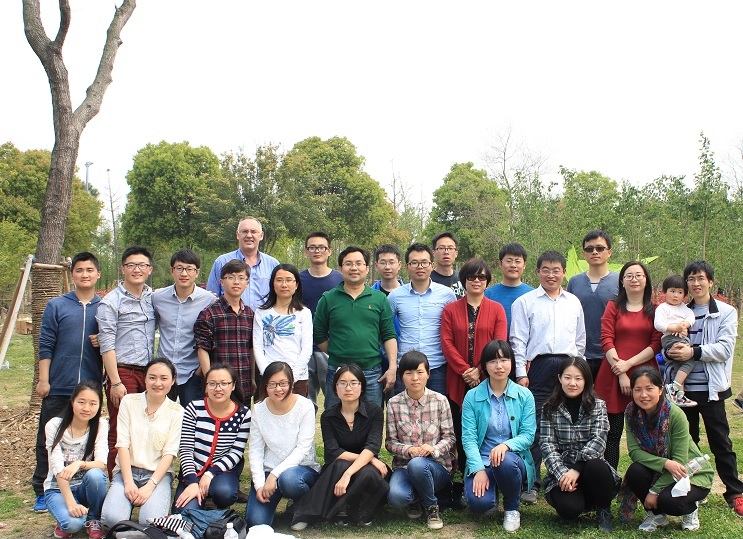 |
| The Spring Tour at Yangcheng Lake Ecological Park in Suzhou, April, 2015
|
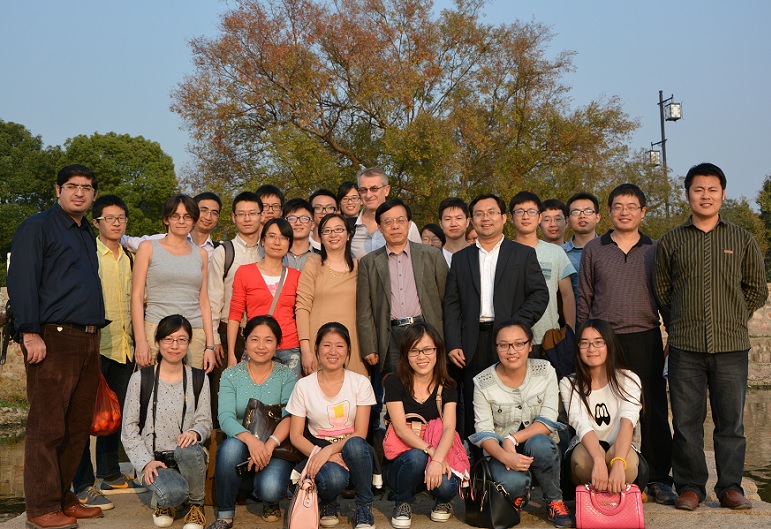 |
| The 2nd International Workshop on Medical Imaging at Suzhou was successfully held by MIPAV lab. And some conferees were visiting a famous scene, named Mingyuewan, Octor, 2014 |
 |
| The members of the MIPAV Lab participate in the Eleventh IEEE International Symposium on Biomedical Imaging held in Beijing ,May, 2014
|
 |
| A picnic at a ecological garden in Suzhou, November, 2013 |
 |
| A tour at Anji in Zhejiang ,June, 2013 |
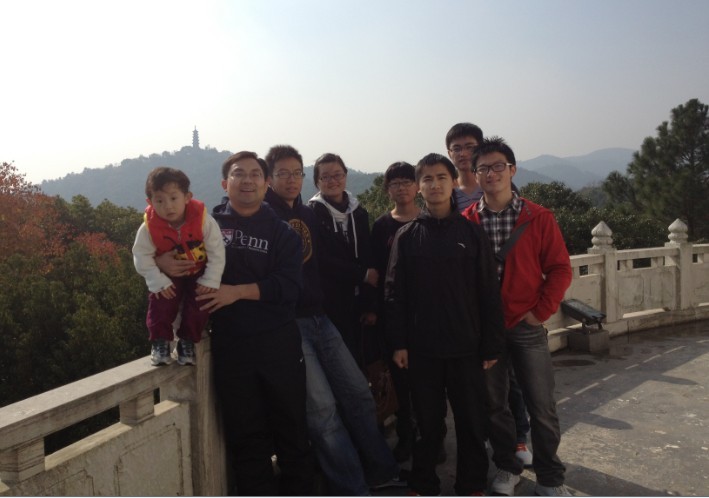 |
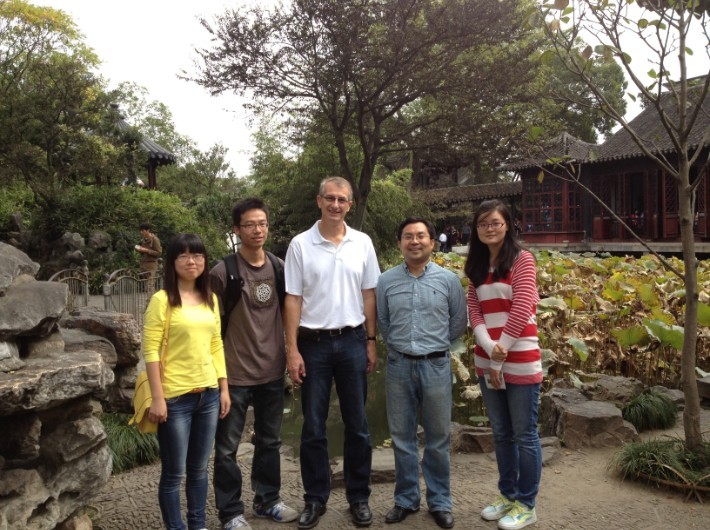 |
A hiking to the Shangfang mountain, November, 2012
A visit to The Humble Administrator`s Garden with the professor Milan Sonka, October, 2012
|
MIPAV student participate international academic exchange activity
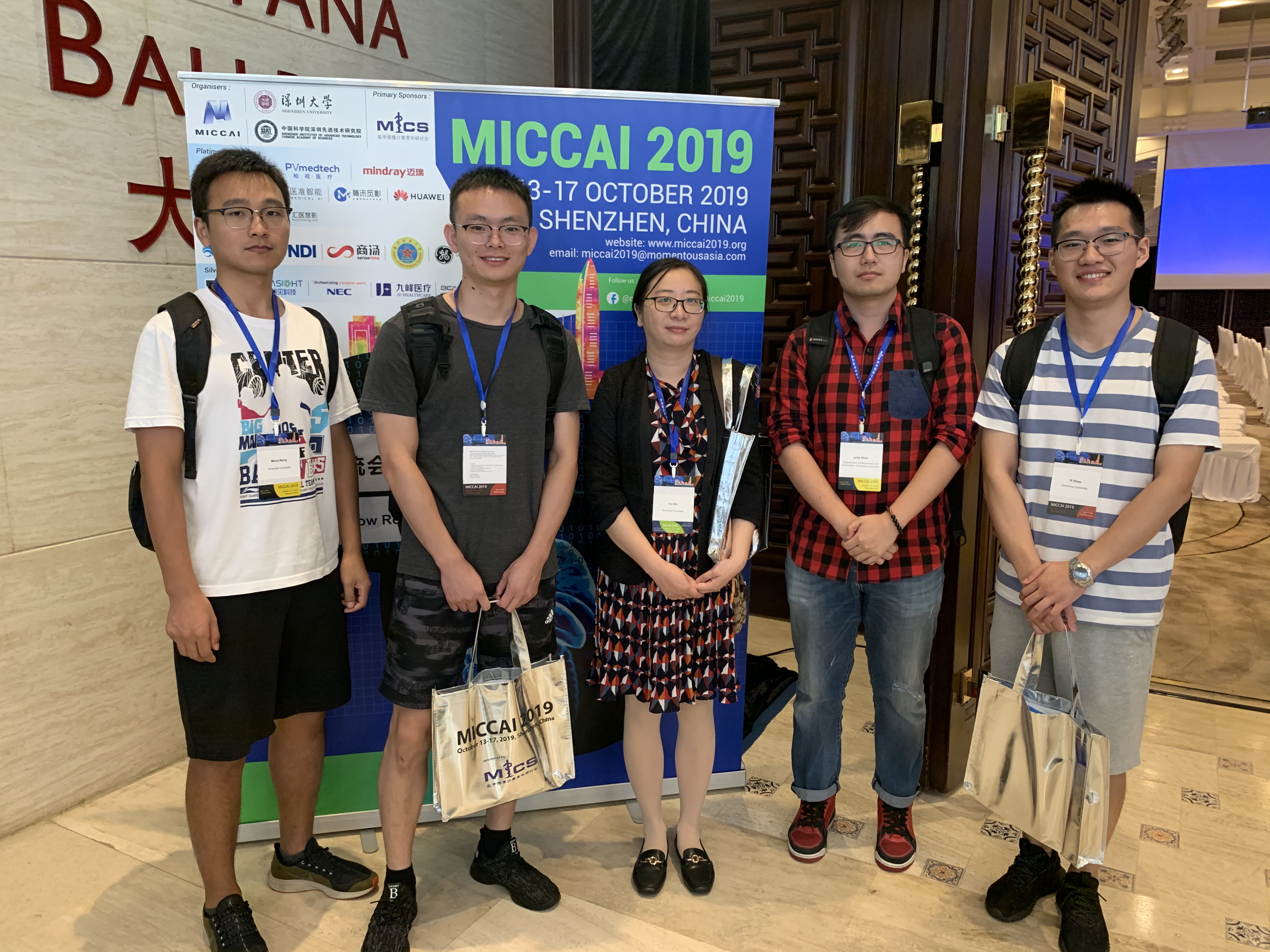 |
| MIPAV LAB Associated Professor Shi takes MIPAV Dr.Kai Yu, Dr.Meng Wang, Dr.Yuhe Shen, Yi Zhou to attended the MICCAI 2019 International Conference held in Shenzhen. |
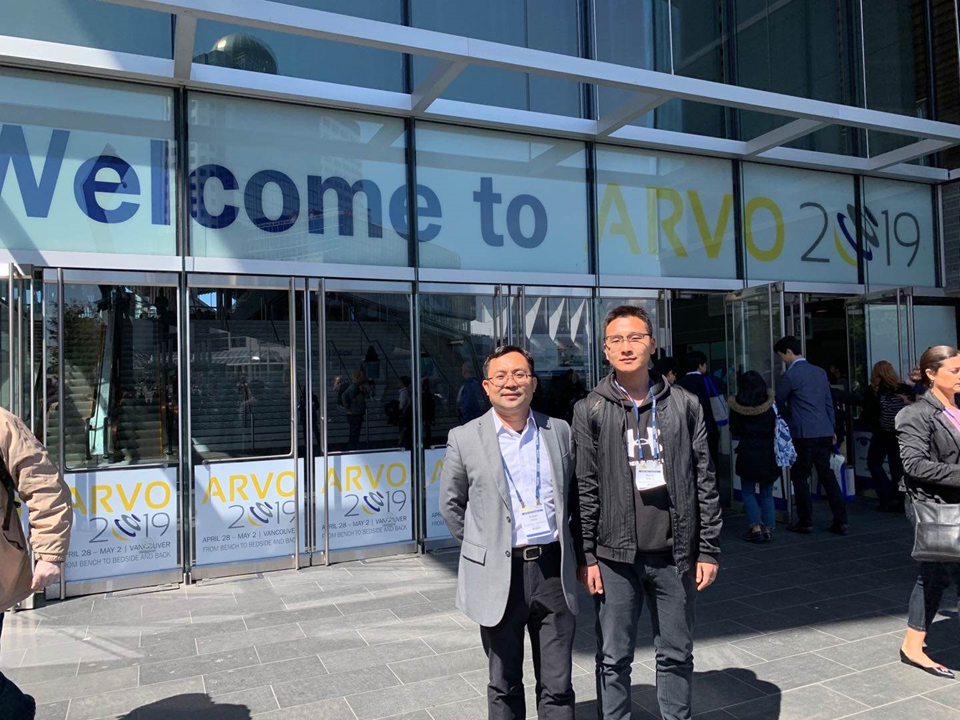 |
| MIPAV LAB Professor Chen takes MIPAV Dr. Meng Wang to attend the ARVO 2019 International Conference held in Canada. |
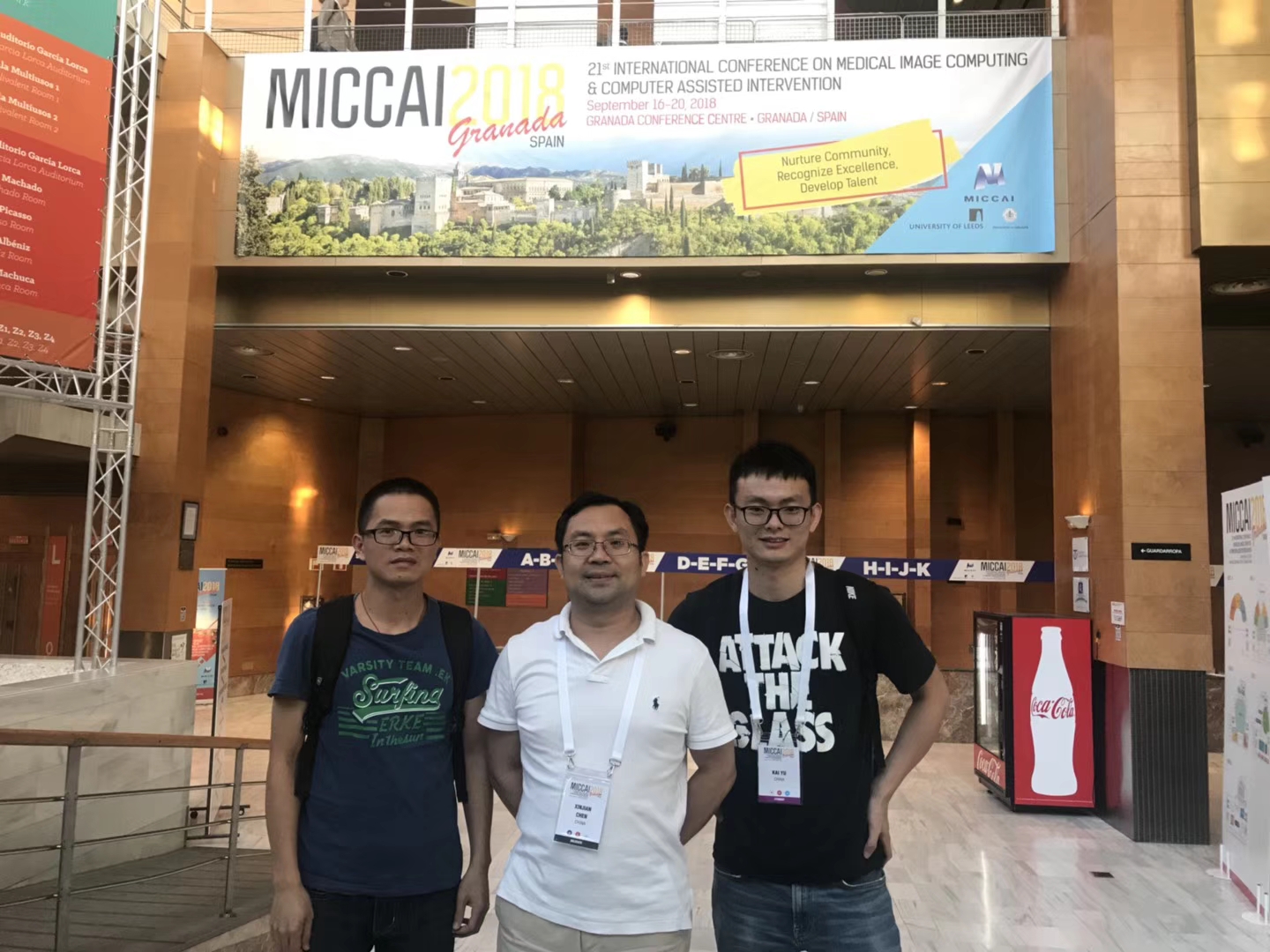 |
| MIPAV LAB Professor Chen Xinjian takes MIPAV Dr. Kai Yu and Dr. Yibiao Rong to attend the MICCAI 2018 International Conference held in Spain. |
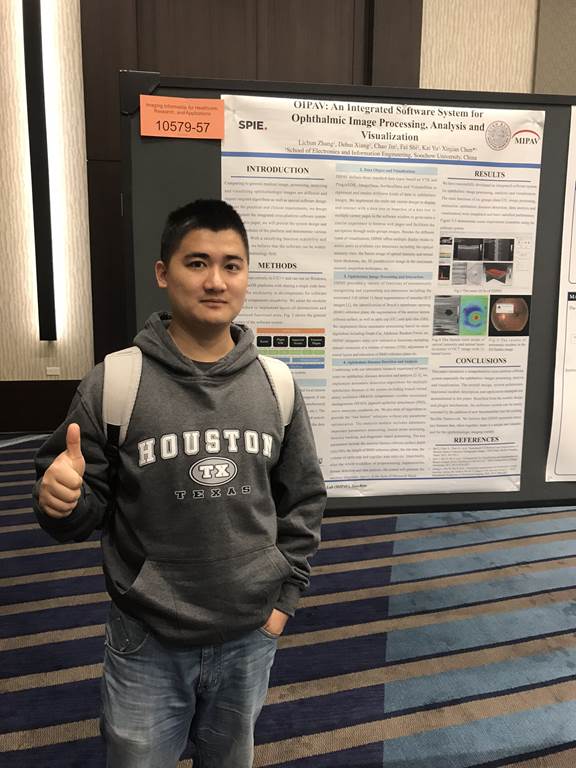 |
| Professor Chen Xinxin and Master Zhang Lichun attend the Medical Imaging Processing and Analysis Laboratory attended the International Conference on Medical Imaging of the International Society of Optical Engineering in Houston, USA |
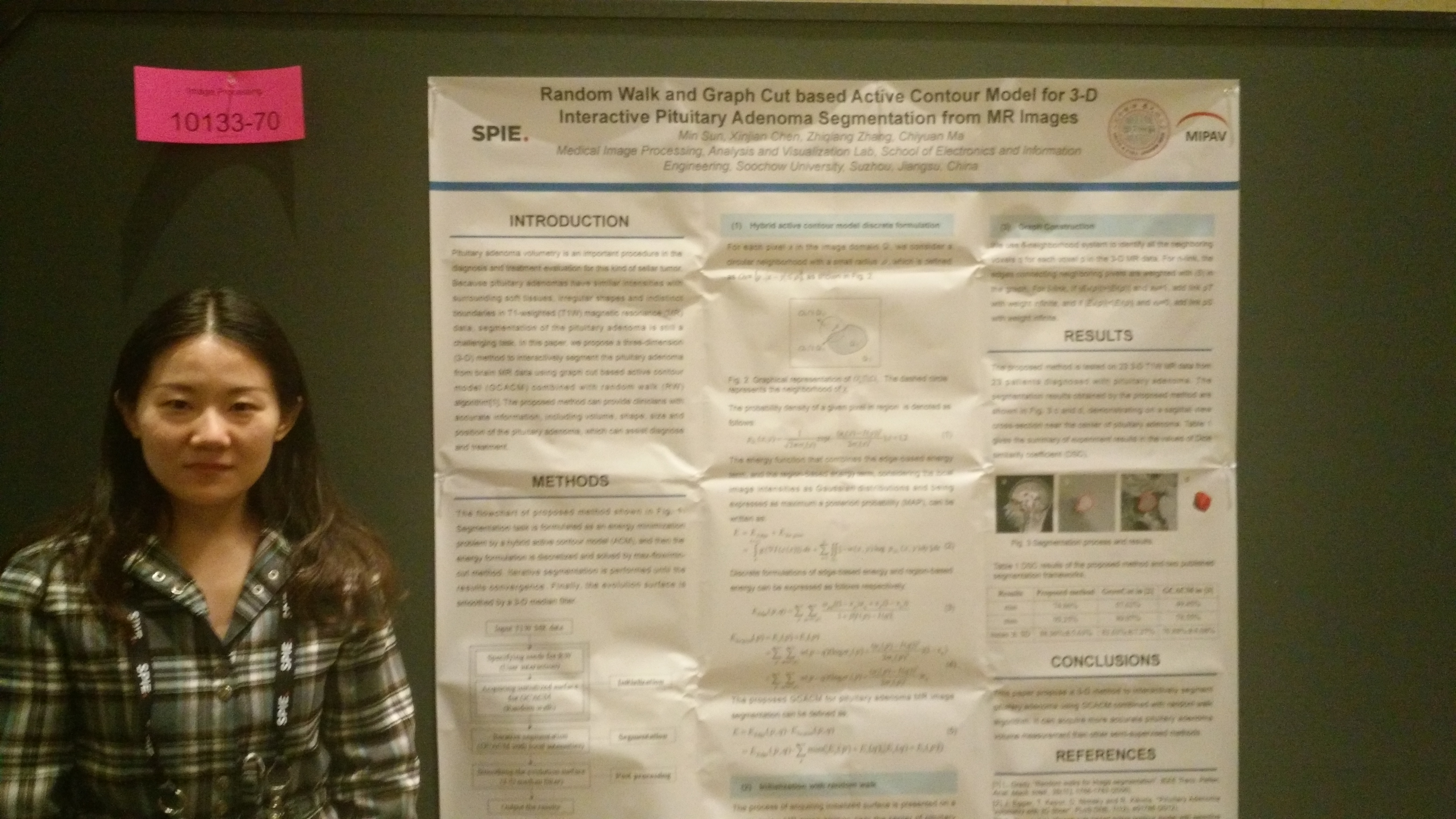 |
| Ph.D Min Sun participated in the 2017 SPIE Medical Image conference held in Florida,AMERICAN |
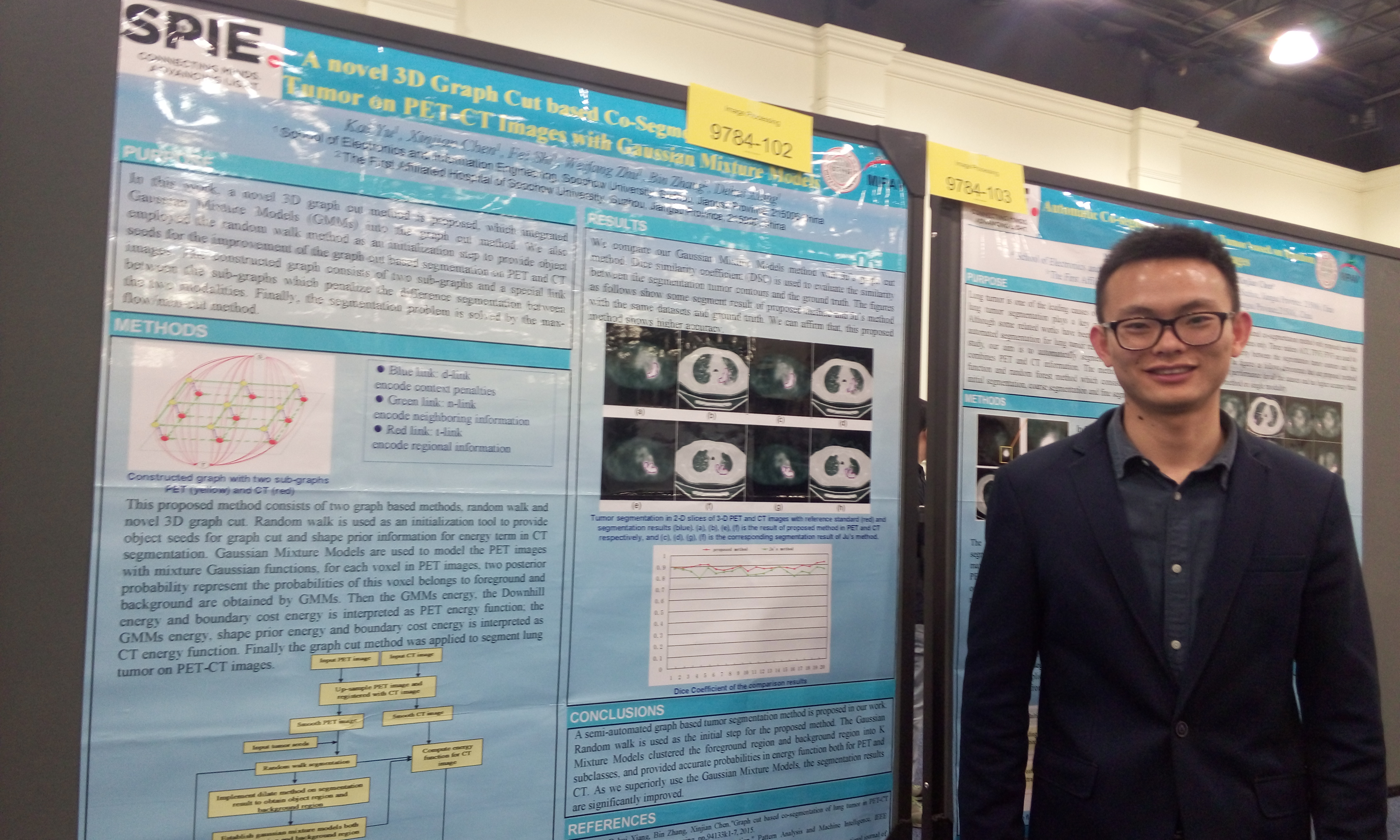 |
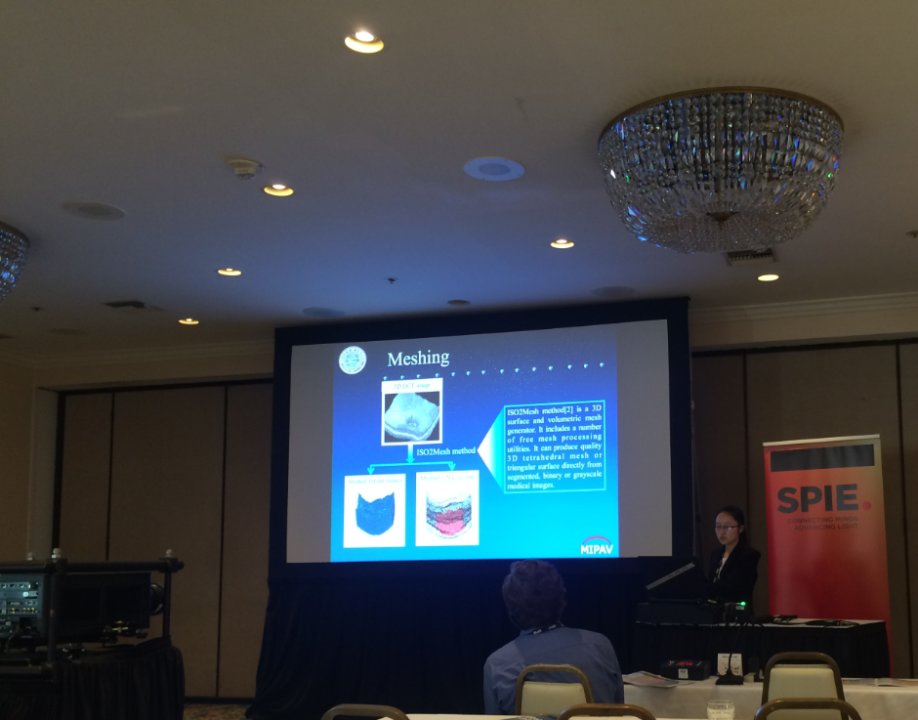 |
| MS KaiYu and Shuxia Zhu participated in the 2016 SPIE Medical Image conference held in California,AMERICAN |
 |
| Ph.D Enting Gao had participated in the IEEE conference on Medical Image Computing and Computer Assisted Intervention |
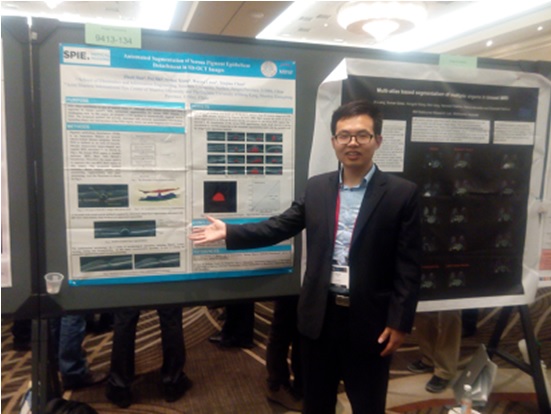 |
| MS Zhuli Sun participated in the 2015 SPIE Medical Image conference held in ORLANDO, FLORIDA ,AMERICAN |
|













